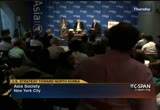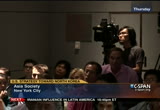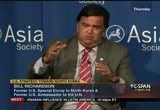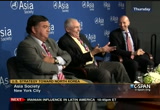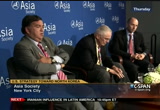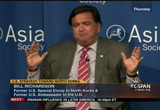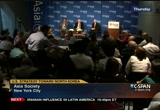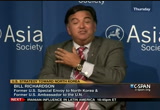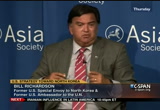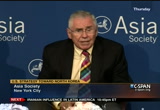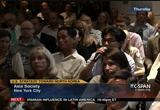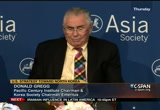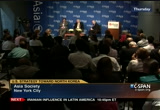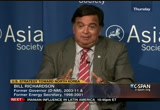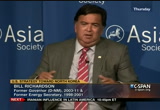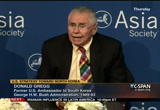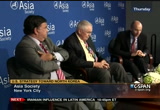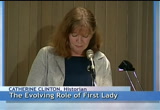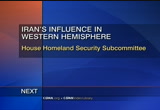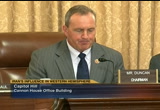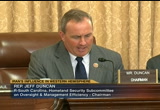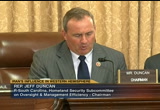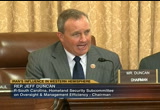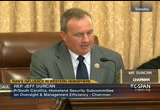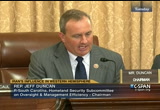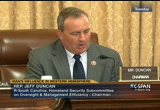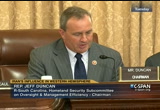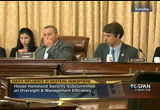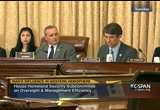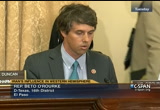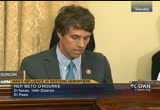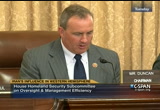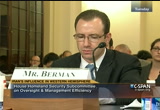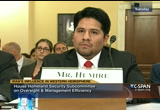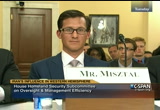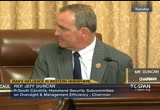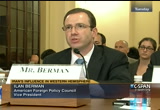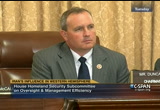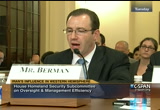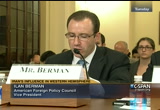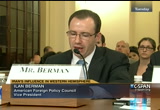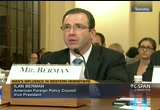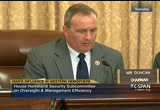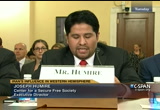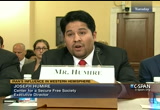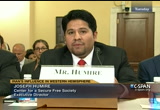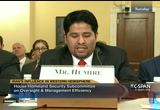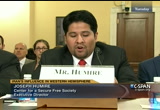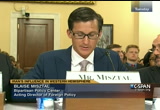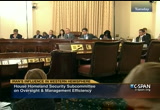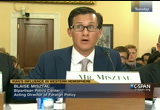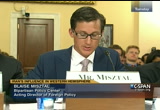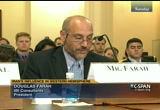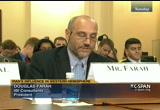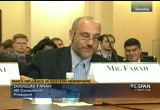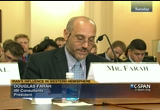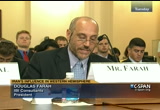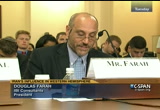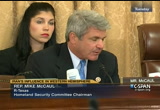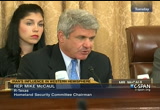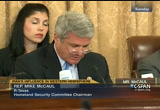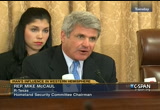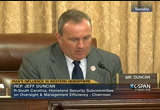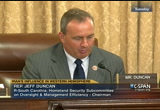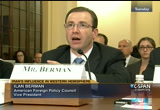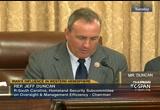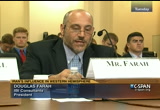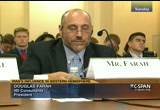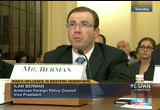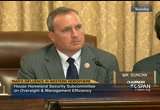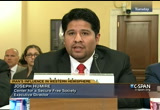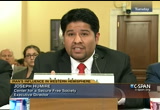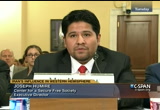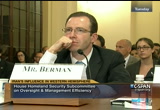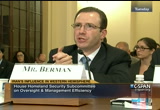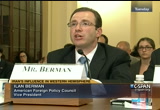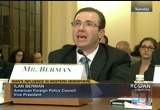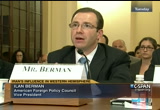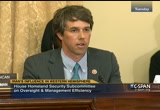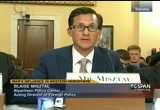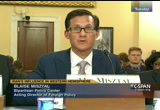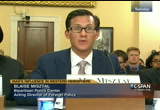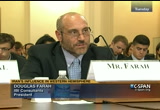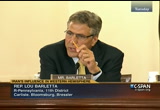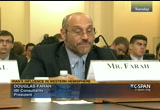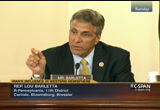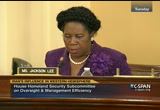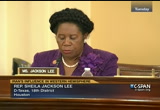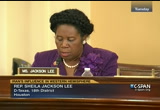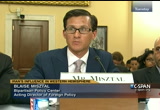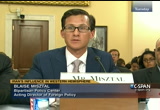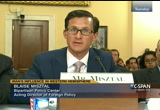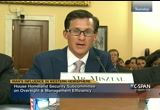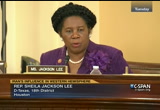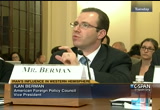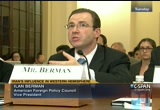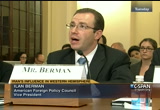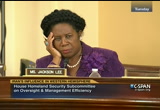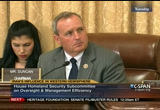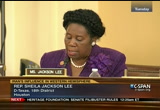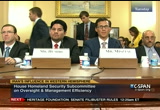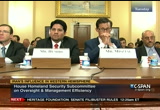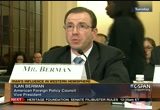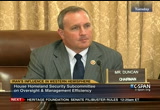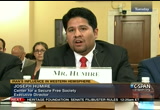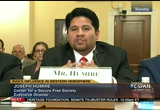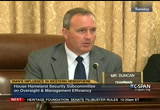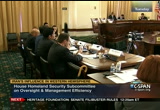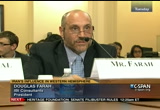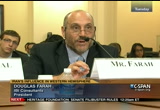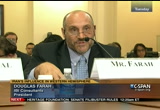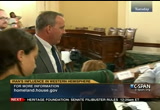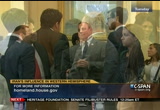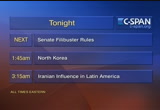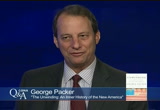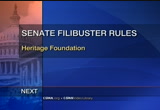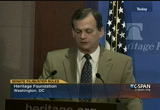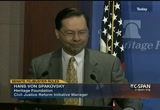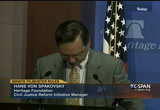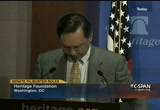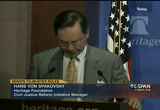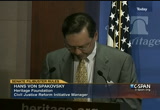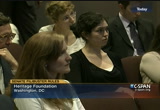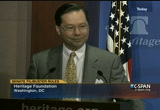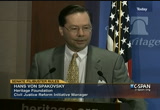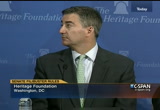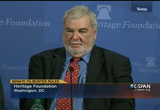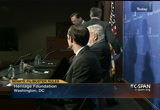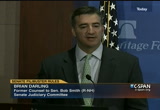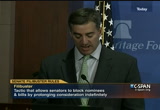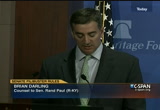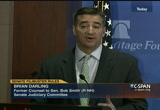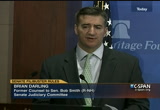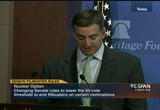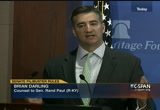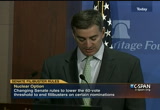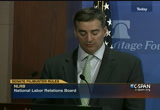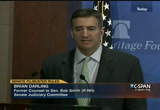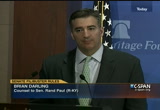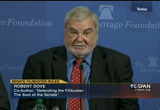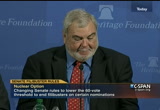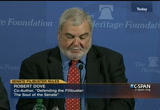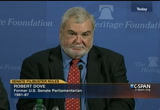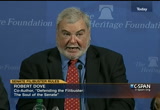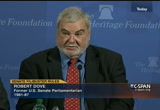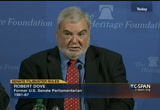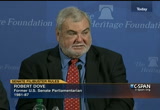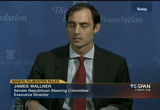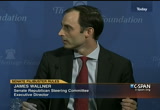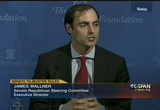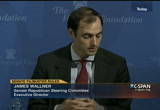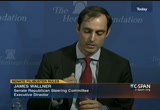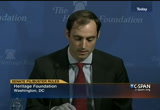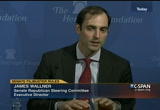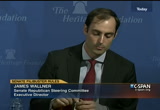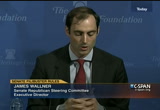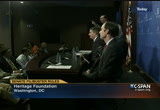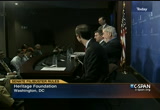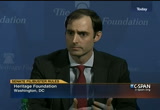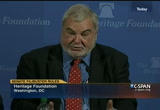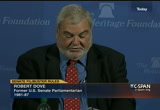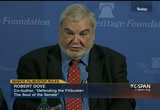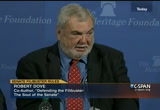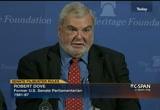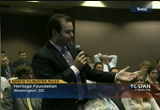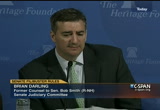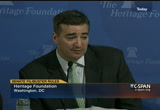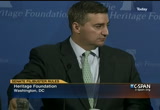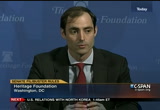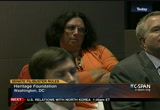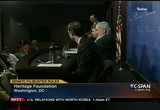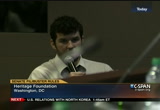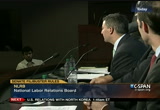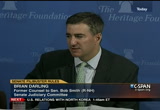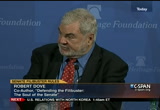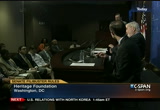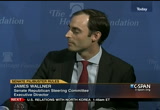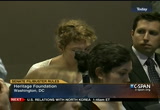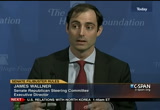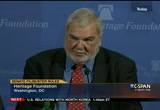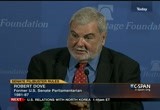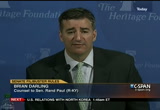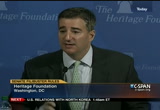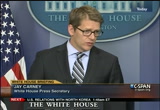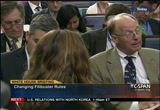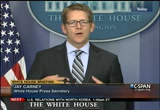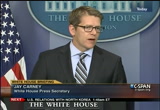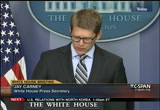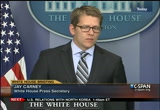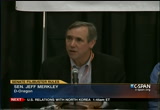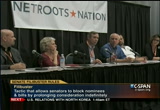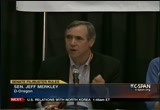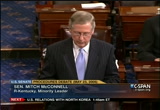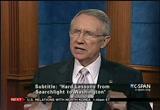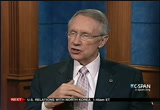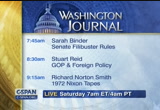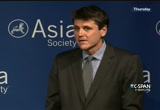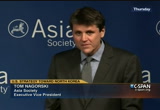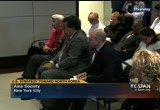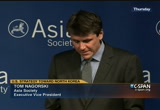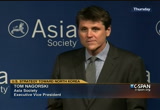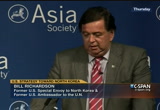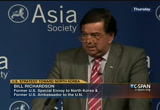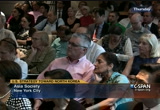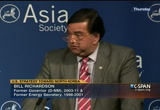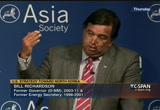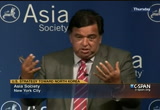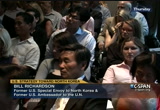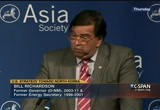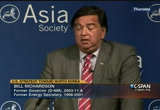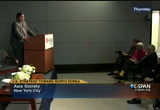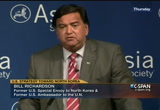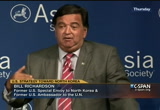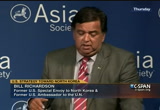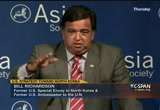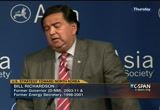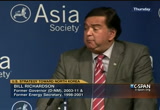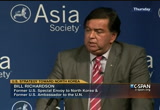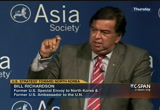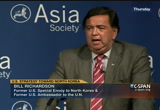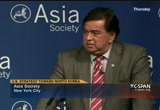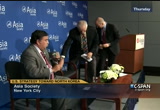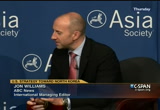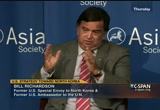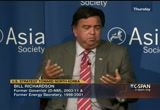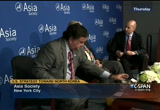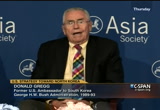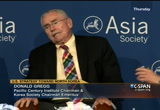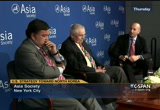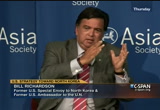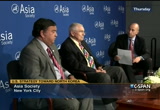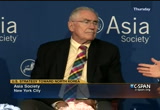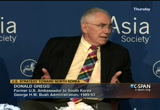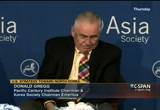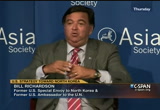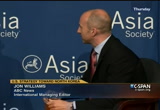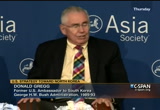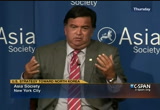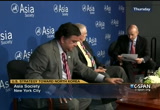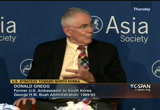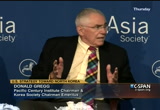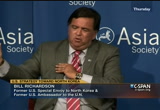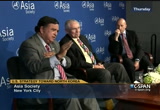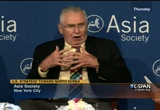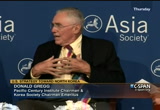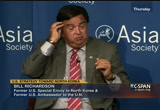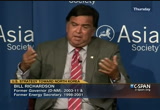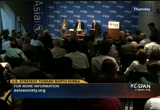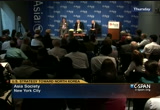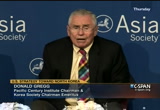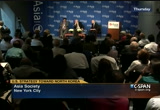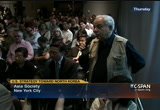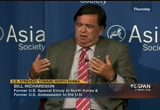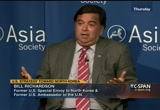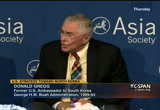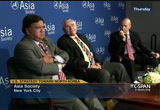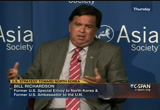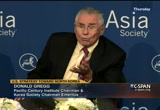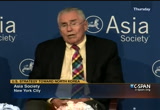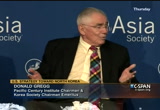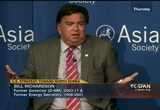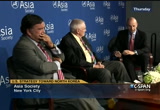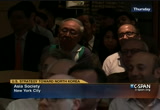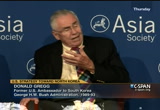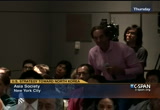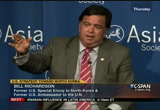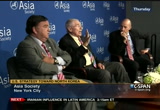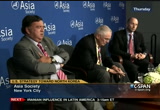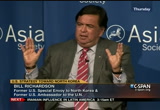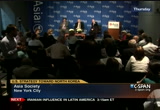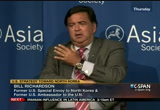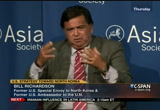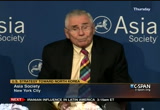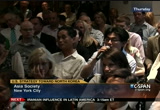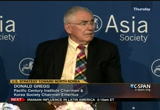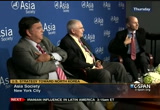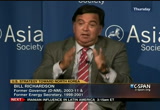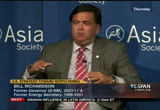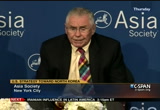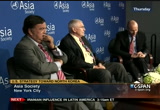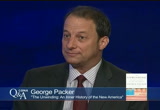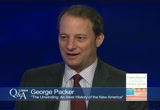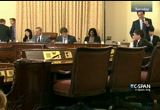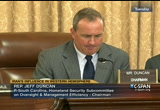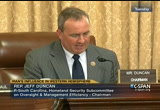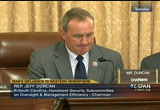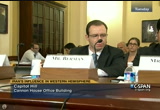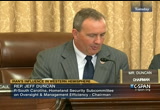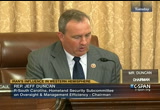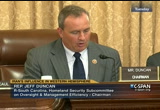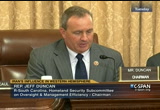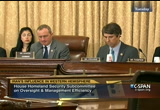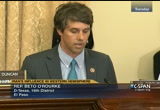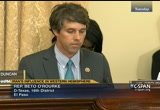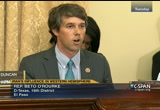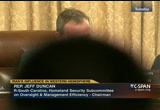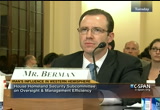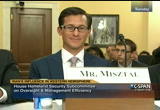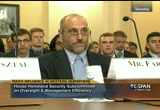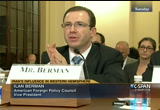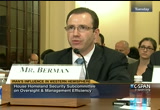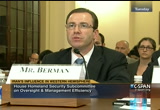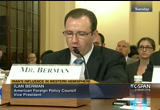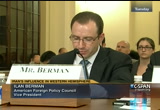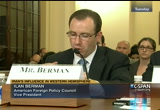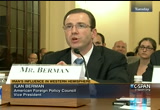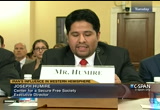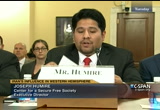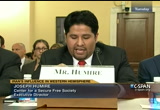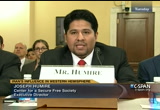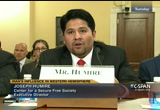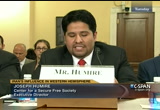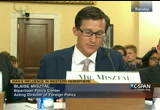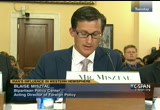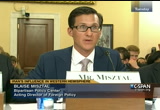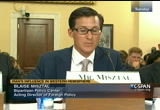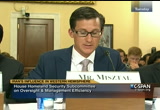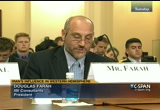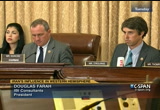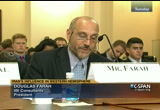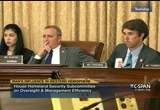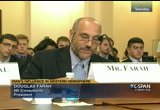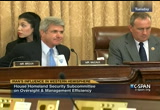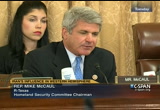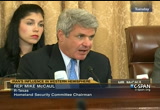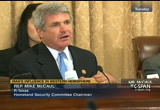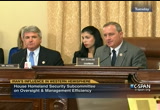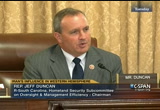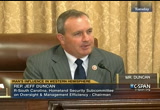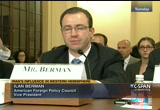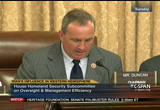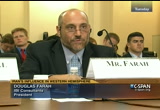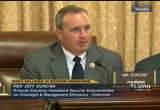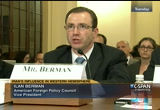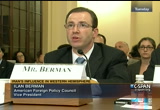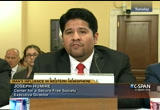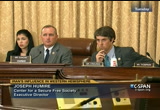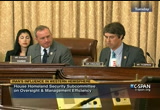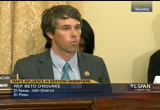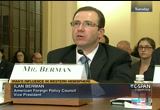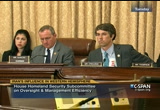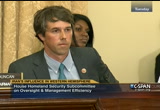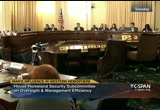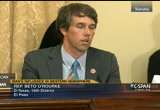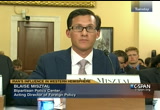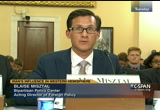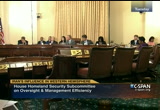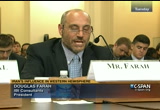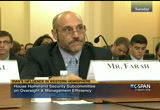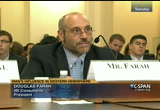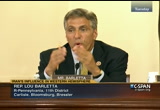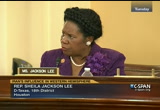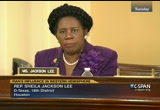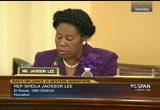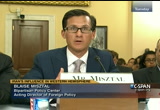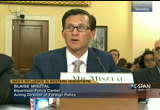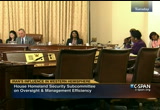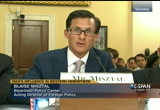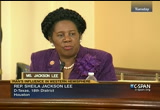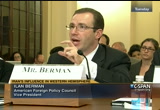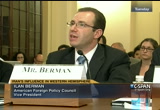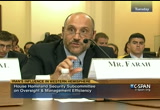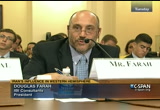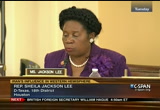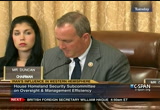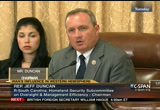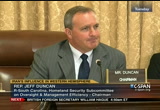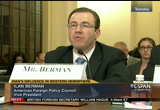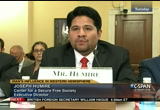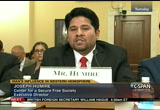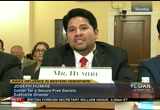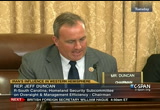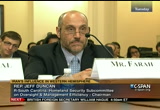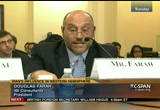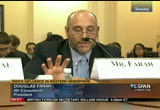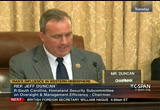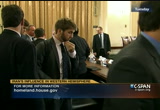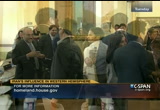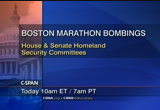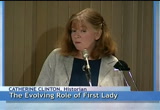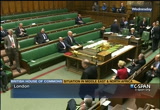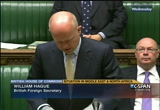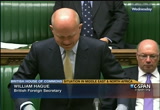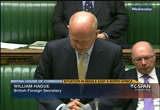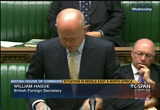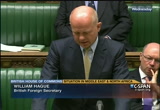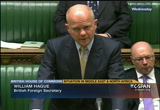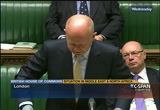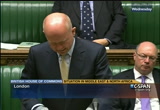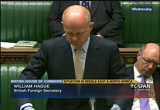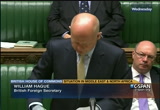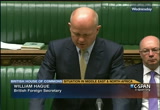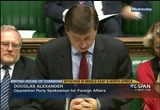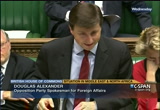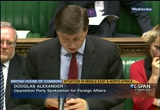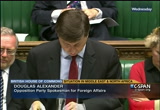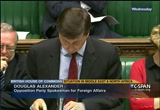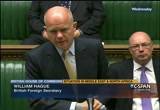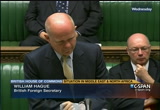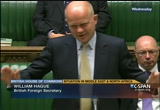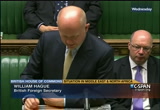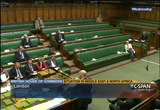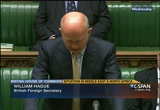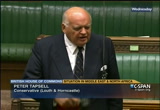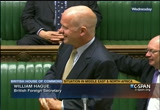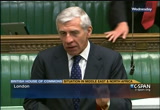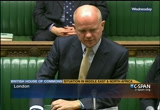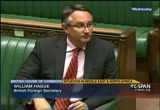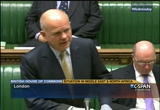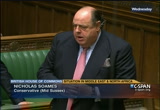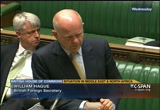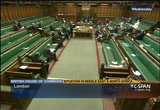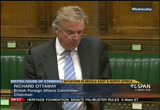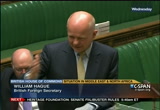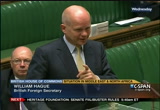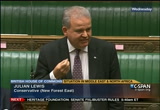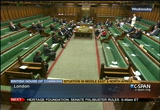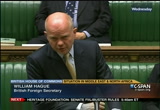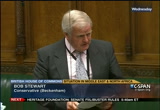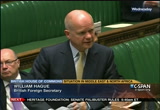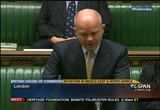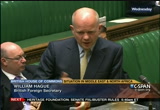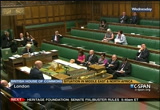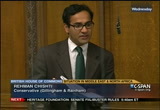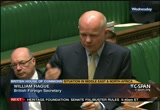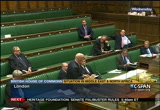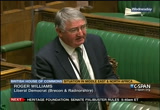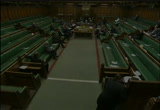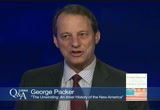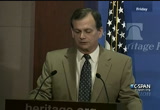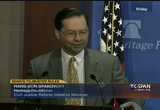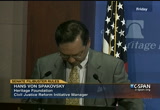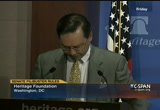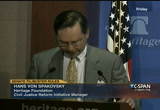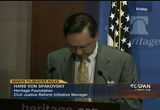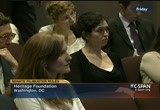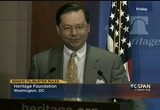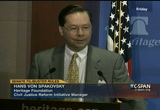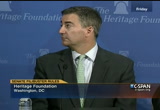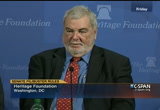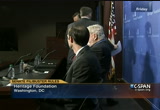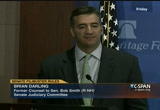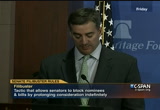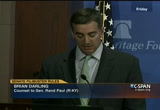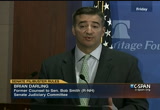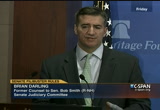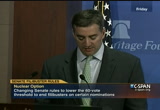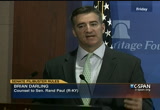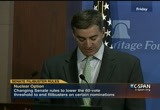tv Politics Public Policy Today CSPAN July 12, 2013 10:30pm-6:01am EDT
10:30 pm
>> i spent a lot of my time trading with china early on. and my question is nobody has addressed the trade issue. why aren't we going to them with a trade insen snive we had a precedent for it. we had 807. that was where we traded with mexico. cut fabric in the united states and then duty preference to product that is came in from mexico. why count we do that with north korea and south korea and the united states opening its market to goods manufactured under those circumstances? >> the reason is sanctions don't permit it. what you're saying is we unload these sanctions in this limited area? is that what you're advocating? n mentioned he brought the
10:31 pm
philharmonic here. they thought that was a big deal. they did one say to me can i bring michael jordan? no id -- look, there is likes kim jong ill western movies. the old cd's i would bring and i know that it was well received. it didn't necessarily bring peace but i recall in this lars trip and i wish i know you invited eric to come, the google guy. but he had real interaction with north korean students at this high-tech school, this computer school. they treated him like a rock star. and i didn't see any hoss tilt there.
10:32 pm
i ventured over the years i ventured into weddings, out door weddings, restaurants, the subway. i love the subways there. you get in there and i never detected any hostility. there were language barriers but i had some interters. i'm an american. i think there is a people to people potential that we can work together. the hostility is at the government level, the military i'm sure towards us. but people to people, i've never detected that negotiatetivity. >> i've got to say i did not take the philharmonic there. it went and i happened to be there at the same time. but one of the great things about it was the master classes afterwards. i went around and there were individual musicians from the similar tomy giving lessons and
10:33 pm
both sides were aston nished by it. the americans were astonnished how good they were and they were aston nished we were being o do it. >> you said you were taking pause from a bit of hardening of the attitudes in north korea. then toward the end of your remarks you said you also saw a glimpse of promise. i wonder if both have r two sides of the same coin in what he's doing now, the new leader is taking the hard stance to win the credibility at home to offer an olive branch to out side of his country and to us and perhaps other western powers? and maybe those are signals we should be reading to give us
10:34 pm
hope we can deal with this new leader? >> i love you for being an optimist. and i will say that's my hope. although it's like 95 to 5 on the hostility side. i read the fact -- and their die tribes. they've cooled down a lot. i see their dibmats running around. i saw some dialogue. i see kim jong un -- i think the 60's an verse si you mentioned is going to be a big show. i know a lot of media is being invited. did you get invited? >> don't tell anybody. >> so it could be a big signal my emerge there and i hope it's a good signal. not we're going to decapitate
10:35 pm
the u.s. and the south korea and everybody. that's my hope that they love these big occasions. to power. succession an verries, funeral dates. you worry they have so many of them. but those are signals that might emerge. > next question. the you could advise secretary general who to suggest appointment, somebody
10:36 pm
the north koreans would preesht and the south koreans would preesht, is there anyone you would suggest? and i have a question for ambassador gregg and that is the north koreans have just had a press conference at the u.n. sking for dissolution of the u.n. command which has nothing to do with the u.n. i wonder what your response is to that? we have the 60th an verry coming up. >> on the special envoy, i would recommend a nor wiegen, sbeed those are always the good guys in the world. plus they have lots of money. the nor wiegens and they give a lot of humanitarian aid. they always know how to move
10:37 pm
the chords peace keeping. that would be useful. the question is whether the north koreans would accept. i think as many entities engaged that are outside the major powers plus the major powers combined, maybe they come up with something. there is other issues besides the nuclear issue. there are sanctions ending the state of war. there is issues relating to banking. you mentioned trade initiatives. other tools of better understanding. by the way, i'm also going to say something about i don't want you all to forget about kenneth bay. he's an american. he's there. he's a prisoner. you know who i think is the only person who can get him
10:38 pm
out? >> michael jordan. >> dennis rodman. >> as a gesture to him. maybe jordan would. but i think it's not going to be and the north koreans have made it clear you send clinton, carter. i think it's going to be something unorthodox but hopefully it will be resolved because this man deserved to come home. >> it's a highly charged symbolic issue regarding the u.n. there were he has than a dozen u.n. troops but it's symbolism. the u.n. intervened militarily. it was the only time they were able to do so. and so the u.n. is a very strongly negative historic
10:39 pm
symbol as far as the north koreans are concerned. it's an entering new request they would make. the symbolism is tremendously high and powerful. i'm not sure we would consider it but it's interesting that you picked up on it. when jon talked about north and south korea two maniac tives and they have to be more active in the thing. when he said that you two smiled and then the question disappeared. can you comment on to what degree north and south korea active and to what degree the
10:40 pm
outside powers have to improve on the matter? >> all the people both north and south who are he havely invested in the status quo, it is not in their interest for things to move because the whole business and industry being set up in a sense keeping countries apart. >> i was always sad -- i was j. e close to kim they never got over that. nd they thought that the election just saved them from a return to the sunshine policy mafia as it were. and the divisions of thought in
10:41 pm
south korea toward it is north are still very strong and they seem to be age based. -- i rning foreigners can don't think foreigners can get at that. people who can remember the orean war have deeply -- there is a book out on korea and gets into that very deeply. hat's a tough issue you raise. i'm a journalist and i report for southeast asian publications. you ambassador, you spoke about out of box diplomacy.
10:42 pm
have you tried getting the asian into this dialogue with north korea because north korea has been sending feelers to some of the asian member states for greater economic interaction? >> it may make sense to do that because you're right north korea atends some of those meetings. i think it is getting stronger particularly with the emergence of burma as a major actor there. i think that's good. we need some new players. i think the six party countries they've run out of gas. now that doesn't mean that one by one you don't take it serious. south korea could be a major player. united states could be a major player. player.n be a major russia is not participating. i really think there is
10:43 pm
something for this russia china relationship that is a little bit troubling to me because those are two big big countries and i don't want them ganging up on us. but new players could be -- but north korea has not had relationships with many countries. i don't want a new player. i don't want syria involved. obviously they've had a relationship with them. i just think it has to be in the region but again, as don and i have said, eventually here is my last point, the united states. everyone once in a while or occasionally in press they dump on us. i go to conferences, they dump on us, other countries. but at the end of the conference they say okay america, what are you going to do? we want you to lead. you've screwed up but still
10:44 pm
lead. even china says that to us at conferences, not official. i'm not saying it's our burden but i think we should let's pay attention. we can't just think of one country, syria. i'm big in latin america. i think we're neglecting latin america. look what is happening with snowden. we'd lose an osa vote in latin america and this is a region that is close to us. >> one thing i'd say as we draw to a close is what has been going on at syracuse university for more than ten years. they approached me more than ten years ago saying we took information technology into the soviet union in china. by so doing we feel we've hastened the change in those two countries. can we do anytime north korea? they are doing it in north
10:45 pm
korea. there is a twin lab relationship between the university and pyongyang. we have trained technicians in beijing. they are almost as good at it as the south koreans are. why do we do it? we feel the more information that comes into north korea, the more easily they will adapt to the fact they have to join the family of the world and begin to treat their own people with the respect that they deserve. >> i'm afraid we've run out of time. we could spend all evening talking about this fascinating subject but governor richard san and ambassador gregg thank you very much. [applause] redit credit
10:46 pm
>> next a house hearing looks into iran's influence in latin america. then a proposal to change senate rules on filibuster on executive branch nominations. then another chance to see the asia society discussion about relations with north korea. >> earlier someone touched upon the idea that women could not really predict their role in entering into the white house. but i did find one political observer who commented at the 1860 election that mayor started with mr. lincoln when he was a poor young man and with no more idea of being called to the presidency than being a cannibal. however i try and lay out in my
10:47 pm
book an educated guess that mayor lincoln wouldn't have let a little thing like human sacrifice come between her and her goal. because he was a very determined woman. she did talk about mr. lincoln's role of entering the white house. she was someone who was a true political partner. as we continue our conversation on first ladies we'll here from his toirns and authors about the role of the first lady and how it's changed along with the nation monday night at 9:00 on c-span. >> a congressional hearing this week looked into iran's political influence in latin american countries. they discussed the diplomatic strategy and efforts to build relationships with countries in the western hem misfear. his is an hour and a half.
10:48 pm
>> the commilt tee on haurt will come to order. the purpose of this order is to examine the threat of iran posed to united states from extending influence in the western hemisphere. before i begin my opening statement i would like unanimous muss consent a written statement and a letter from the american task force be entered into the record. hearing no objections, so ordered. i now recognize myself for an opening statement. iran's pert chule defines coupled with propensity for terrorism worldwide constitutes a recipe for instability and
10:49 pm
threat to security of u.s. homeland. for years iran has been testing patience with it's subversive actions. in the last two years their attempted attacks in india, thailand, georgia, cyprus, bulgaria and a foiled plot in washington, d.c. demonstrate an audacity we should find chilling. today iran employees the capability to mobilize it's obal network of security and mois. the guards corp, the cuds force and operatives to further its objectives and threaten the u.s. security. it is concerning to me that ven though iran has stated the promotion of cooperation of latin american countries is one its top priorities this administration refuses to see iran's presence so near the
10:50 pm
u.s. borders as a threat to u.s. security. last month the state department released a report in response to legislation that i authored in the last congress on the threat to the u.s. from iran. the unclassified summary found iranian influence in latin america and the caribbean is waning. there is not consensus on this issue. but i question the administration's judgment to down play the seriousness of their presence here at home. congress has focused on activities of iran in the region. several house and senate hearings have been held. members of congress have travelt to the riege on the investigate for ourselves if reports of y rainian activity in latin america were true. both houses of congress passed bipartisan legislation highlighting our concerns. this administration produced a report that neglected the input
10:51 pm
of our foreign allies in the region and did not meet the intent to address this threat. further more the report did not consider all the facts by disregarding the reent findings from the prosecutor of the ar general tin israel lite association. stark contrast to the state department's investigation, it revealed iran has infiltrated large regions of latin america through intelligence stations and is ready to exploit its position to execute terrorists attacks when the regime decides to do so. the investigations of the ami bombing investigations were asked to share. i see his chair is empty.
10:52 pm
the decision by the government of ar general tina to deny his permission to testify today on the grounds this hearing has no relation to the official mission of the attorney general's office is deeply troubling and grossly inaccurate. he sent a caller: of the findings to the u.s. deposit of justice. the u.s. wants to learn more about operations within this hemisphere. it is interesting to note today is the an verry of those bombings in argentine na i believe. >> the investigation found that iran was the main sponsor of an attempted attack on american soil in 2007 to blow up the john f. kennedy airport. had the plot not been uncovered a number of americans could have been killed. iran's influence is waning,
10:53 pm
needs to provide clear justification. wearing blinders will not make it go away. considering the direct threat from iran. dhs only had 40% of our southern border under operational control ooned only 2% of the northern board certificate considered secure. d.h. sfplgt has not put forth a plan to gain control of u.s. borders. how can we be sure that y rainian operatives are not smuggling weapons or drugs into our border. the number of illegal aliens other than mexicans being apprehended has grown over the last several years and we do not currently posses a mechanism for determining how many successfully enter the country illegally. since september 11, 2001 the department of homeland security has reported increase in
10:54 pm
arrests of illegal aliens from special interest countries. however it's not just our southern border we need to watch. according to a july 2012 report from canada, iran is the number ne source country of unproperly documented immigrants who make claims in canada. t is in latin america they are traveling to canada to make these claims. there have been individuals with fraudulent passports traveling freely within the lat tin america due to lack of border security measures. intelligence found the use of false documentation is widespread. false pass port documents are used by the organizations activities in their travels all over the world. the u.s. and neighbors should be working to close these
10:55 pm
loopholes. we have already seen penetration within the united states borders. several supporters have been arrested in the u.s. after controlsing the mexico border. a cell was discord in 2002 in north carolina. the new york city police department has called y rainian operatives certaining conducting preop relational terrorist surveillance of potential targets including the new york subway. e d.e.a. foiled a plot two years ago. in may the iranian involved in this plat was sentenced to 25 years in prison for his role. in conclusion we cannot reject the notion that iran may be planning more attacks within the u.s. borders in the near future. we cannot down play the threat to border loopholes. we need leadership, a strong border security plan and closer
10:56 pm
ties to our neighbors because we all face repercussions if hey mobilize in and around the region. the chair recommend nices the ranking member of the subcommittee but the ranking member is in arizona attending a service for the fallen firefighters there along with mr. salmon the subcommittee chairman also has a invested interest in this topic. so we will keep the folks in arizona and the two gentlemen from congress that are at that service in our prayers and thoughts today. so now i recognize the ja from texas for any statement that he may have. >> thank you mr. chairman and i want to extend my sympathies and thoughts and prayers to the families of those firefighters and the representatives there with them now after this horrible tragedy out west. before i begin my opening
10:57 pm
statement i want to ask for unanimous consent to allow mr. vell la to join us in the committee. >> so ordered. >> i want to thank you for queening this hering and bringing together these expert witnesses on a subject matter that frankly i'm not as well versed in as i would like to be. it's one that i probably didn't expect to be discussing or working on as a member of the homeland security committee. but it's clear from your opening statement and the legislation you worked on and passed that you take very seriously our responsibility to understand and counter these threats before they reach the homeland. i think that's important and i want to thank you for your work on this effort including queening today's hearing. i also want to note that we have made some progress in our relationship with iran and in could wantering their threat
10:58 pm
globally. the international community joined us in imposing several rounds of stricter sanctions against iran to deter support for international terrorism, it's human rights violations and efforts to develop a nike weapons program. i believe and i think the facts bear out these sanctions are having some of the impacts we want them to have. we see significant oil revenue losses and inability to participate in the international banking system. a sharp drop in the value of iran's currency and inflation now over 50%. by many accounts these anxious sanctions have weakened iran. and in accordance with chairman duncan's counter iran in the western hemisphere act, the state department recently issued a report on the threat posed to the united states by iran presence in the western
10:59 pm
hemisphere and according to that report iran's influence is on the wean in the western hemisphere. the reported found international pressure has weaknd the iranian regime and most of iran's promises to latin america have gone unfull filled. i would like to again thank the chairman and the state department for their work on this important report and thank the state department for its compliance with the act. this is a report that was delivered on time and in accord with the legislation that directed the state department. while there are those who are clearly disappointed in the findings that are in the state department report, i don't see any reason to believe that the state department was not diligent in its efforts and that the find rgs not consistent with reality in latin america and in iran. i look forward to hearing from the experts on this subject,
11:00 pm
getting their testimony and hearing the answers to their questions. and i also want to note that those who are tring today are not governmental witnesses. it would have >> hopefully we can have a follow peering or some time with state department officials to get answers to our questions. i want to thank the witnesses for their testimony and thank the chairman. with that, i yield back. >> i think the gentleman. gentleman.the reply to try to attend the hearing, but he is not going to be available for an opening statement. remindedbers will be that they may be submitted for the record. we are pleased to have a distinguished panel of witnesses
11:01 pm
here today for this important topic. we are disappointed they were denied the opportunity to testify before the subcommittee. we have a chair, and helps that he will come through the door. his testimony would've provided information on the threat from iran for the u.s. homeland. we hope to hear from him in the future. the mirror mine the witnesses that their entire written statement will appear on the record. i will recognize you for your testimony. the viceductions, president of the american foreign-policy counsel, an expert on regional security in the middle east. u.s.s consulted for the central intelligence agency and department of defense, as well is provided assistance on foreign-policy to arrange of government of offices. he is a member of the associated
11:02 pm
faculty at missouri state university department of defense . he served as the columnist for forbes.com and the washington post. mr. joseph humira is the executive director of the center society.e he has testified before the canadian parliament and provides assistance to numerous committees in the u.s. commerce. he publishes regularly and is written articles. groupa cofounder of the of international llc and strategic consulting firm that offers research and analytical services to u.s. and international clients. he is an eight year veteran of the u.s. marine corps, having served in iraq and the liberia. thank you for your service. -- is themissile
11:03 pm
acting director of foreign- btc is aea he joined senior policy analyst in 2008. he directs a new initiative aimed at developing recommendations for u.s. public diplomacy to address 21st century security challenges. btc'sntributed to all and as well as the report focus on how to stabilize vital states. the cybernched security initiative by erecting the 2009 cyber shockwave simulation, and has spoken on the need for butter -- better partnership to respond to cyber attacks. -- ferra.s there are a 2004, he worked with
11:04 pm
consortium for the study of intelligence studying armed groups of intelligence reform. foreignecades, he was a correspondent and reporter for "the washington post." as reporter, he traveled to latin american countries and investigated the exploding drug war, emergence of russian crime groups, and the growth of mexican drug cartels with the united states. he traveled and revealed the truth about the brutal civil , and brokerra leone the story of al qaeda's trade networks. thank you for being here. we are going to pause before your testimony. we are joined by the chairman of the full committee. i thought mccall call walked in. >> i apologize. i thought he had walked in. with you.art
11:05 pm
thank you for being here today. i look forward to your testimony. i will recognize you for five minutes. >> thank you. thank you for chairman duncan for your leadership on this issue. it is one that i believe is of significance to the security of the united states. by frame where latin american fits in with iranian strategy. it is necessary to understand that. it is useful to understand that in geopolitical context, iran's activities are part of a larger peripheral strategy. in order to respond to its growing diplomatic and economic isolation, as a result of the sanctions that were talked about, they are being levied by the west over its nuclear program. they are also an antibody
11:06 pm
iranian leadership to combath diplomatic isolation is that alienatings of iranian policies that are taking place throughout the litter -- middle east. it hasey are doing is begun to look further for allies in various regions of the world. that means that when i ran is an -- what iran is doing in latin america is not unique. you can see in places like africa and asia. they're making inroads. the differences that latin america is more mature as a foreign-policy project as result of the unregulated spaces that exist in the region and the existence of sympathetic regimes. what they have managed to do over the last 8-9 years has been focused on four major lines of did mike -- diplomatic attack. political outrage. since the mid-2000, they have
11:07 pm
invested in political contacts with the region. it is done so in a number of levels predicted medically, it has doubled its to my neck residence -- diplomatic presence in the region. on the public diplomacy front, iran has created a dedicated spanish-language outreach channel, which broadcasted more than 10 countries throughout the region. addition, and arguably most important, iran has the extensive cultural ties throughout the region, leveraging the 16 -- the cultural systems it has established in the region, and informal ambassadors around the region. spread its influence, and also to make latin american audiences acclimated to its message. this i want to point out is not
11:08 pm
defensive goal. it is a reaction to western pressure. he goes beyond that. it involves a type of coalition building that is intended to make the region more hospitable for iran and more inhospitable for the united states. the second line of attack that they pursued involves economic activity. iran has historically used latin america as a theater of support for activity. they funnel back to edit that the iranian regime. over time, iran has leveraged that informal activity with almost 500 cooperative agreements with regional governments. it should be noted that the vast majority of those agreements are made unfulfilled. with the exception of what they have done with venezuela. their overall trade with the region has grown considerably in recent years. it averaged proximally $1.3 billion a year. this, out of last year,
11:09 pm
figure has more than doubled and stands at $3.67 billion. the economic footprint in the region is increasing. in terms of strategic resources, for is pursuing an looking minerals such as lithium, tantalum, and others which have strategic purposes for its nuclear weapons program. they become prospecting for uranium, including in eastern venezuela, and in eastern bolivia around the town of santa cruz. these reports are spotty. they are unconfirmed. there is concrete evidence that iran is lifting other minerals in support of its programs. iran is pursuing an asymmetric presence in the region. the formal presence they have built and is erected over the last eight years has been mirrored by the growth of a paramilitary infrastructure. onroxy increasingly robust
11:10 pm
capabilities in the region, including leveraged against the u.s. homeland. the director of national intelligence noted in his testimony to the senate that iran's regional alliances can pose an immediate threat by giving iran directly to the -- a flat warm in the region to carry out attacks. thatnk it is worth noting time does not stand still. they geopolitical footprint is in a state of flux. this is because iran's strategic gateway to the region, the isina hugo chavez significantly better days. the death of chavez in april and his succession has also witnessed a transition to an increasingly rickety economy
11:11 pm
come a one is experiencing shortages from our thing from us -- sugar to toilet paper. it calls into question their ability to promote iran and support iranian objectives in the region. it is worth noting that iran's present in the region is not on the decline. at least not yet read it is hard to assess that iran strategic presence is waning, when every line of attack that i mentioned, they are either maintaining the level of activity or expanding it. i think it is useful to understand that in the grand sweep of iranian strategy, iran as much more robustly positioned in the region than it was eight years ago. thank you sir. >> thank you for your testimony. we recognize the next testimony. >> good afternoon. thank you for inviting me here
11:12 pm
today. me again by saying that after the lengthy investigation, it is taken me to 15 countries throughout the area. after examining the data i've collected, i have arrived at the influence of iran's is growing. the -- wills are compare the two other actors am a such as china or russia. some may go as far as to compare them to the united states. this is a faulty analysis. when examining their strategically, it is important to get the benchmark right. it is comparing apples to oranges. the only way to get an accurate sense of whether their influence is evolving, growing, or has when -- has been waiting, is to the player -- is to compare today.
11:13 pm
in almost every indicator, whether it is trader diplomacy, or some of the lower dangers thecators, the deed -- trajectory is higher. were addicted to geopolitical events in the middle east. in 2008, they are indicative of -- global events and this geopolitical events in this hemisphere. by 2000 and, in just three years, this alliance is already targeted governments in bolivia, the koran what, and other satellite caribbean countries. syria are now observing members of the alliance. some may say so what. after all, the alliance is made up of some of the poorest countries in latin america, with
11:14 pm
weaker military sprayed this is only mostly true. study through the lens they study themselves, then you realize that they are much more powerful. if you include de facto members, such as argentina, then the geopolitical alliance is comprised population of 100 across -- anning how does this relate to iran's influence in the region? the influence and now -- latin buzzca is dependent on how in the this was detailed
11:15 pm
11:16 pm
international sanctions. iran is capitalize on a variety of identification schemes throughout the hemisphere. it is camouflaged. it is vulnerable for this threat. lastly, venezuelan bolivian state-owned enterprises in energy and translation sector provide a bill for iran's growing military footprint in the region. that did not exist a few years ago. mr. chairman, too often analyst make the mistake of looking for the smoking gun. and million dollar while a transfer, or a missile silo. iran and the allies are too clever for that. they invented chess. after every move they make in the hemisphere, everything is calculated, thinking two steps ahead. just because we do not seem to meet service is not mean there
11:17 pm
is nothing behind the surface. the absence of evidence is not the evidence of absence. for my investigation, i've discovered that iran definitely has the potential to harm our allies in the western hemisphere. >> thank you. ourchair will recognize next witness. >> i appreciate the opportunity to pay before you both today. -- was not able to present his findings. all thatroceedings are more important. designing policies to counter threats to the american homeland requires understanding its strategy and intentions. the partisan politics combined several unique approaches to do that. we have studied iran's grand strategy and the pursuit of
11:18 pm
their nuclear weapons. we study emerging terrorist threats, and we are proud to hope -- host as a senior fellow. this combination of perspectives examineallows us to iran's conditions and how might shape its tactics in our region. the activities in the western hemisphere have three primary motivations. cultivating stronger ties with nations that oppose the united assistanced economic , and establishing technical capability to target you -- u.s. interest. dynamics could impact iran's ability to succeed in any of these areas. with a passing from the state- of-the-art rhenium president of occam and a job --
11:19 pm
there anemic economic performance will wake in these regimes, limit their ability to assist there on. unchecked, the anti- american bloc in the region will likely grow more fervent and increasingly desperate for allies. the own political and economic isolation are the result of sanctions and will drive it to seek friends wherever it can. thus us, the bond between iran and venezuela is likely -- unlikely to be broken. unable to help each other, both are likely to turn to a third- party, russia or china, for assistance. the islamic republic of iran is not interested in economic support for it is determined to impose its brand of theological totalitarianism on the middle east. this ambition translates to
11:20 pm
undermining u.s. power wherever it can. the tactics have evolved over the 30 years of its existence. the first half of their existence under the current regime was nominated by direct confrontation with the signings. and a strong ties the lebanese terrorist group, has below. there are little doubt that these exist to attack american interest. they use it to further ambitions. toiran, they are likely strain for now. this trend is likely to continue. i ran they're not risk any action that would risk reprisal. iran's leaders note that to
11:21 pm
indie, the closer the nine states and iran draw direct conflict, whether in syria or over iran's nuclear program, the greater the chance of iranian sponsored terrorist activity in our hemisphere. there are concrete steps that should be taken now to better prepare the eventuality that it changes. good police work can foil terrorist plots. working with law-enforcement agencies, particularly in columbia. these efforts should be further bolster. critical for this task is affirmative homeland security training centers, and international capacity. u.s. intelligence cooperation with partners could contribute to abilities to detect terrorist plots brave woman to do this is to expand the presentation of foreign countries.
11:22 pm
the asymmetric abilities and terrorist allies is to remain limited for now. it is only those cases where there is ongoing believe to bring their dreams closer to reality breed we should use this to better secure our homeland. thank you. i look for to your questions. >> thank you. farah not recognize mr. for his testimony. welcome back. >> thank you. i agree it it is one of the most pressing national security issues we face. i began on behalf of myself and not tsi s. iran's influence in latin america is growing. one must understand the changing context in which iran is operating in latin america. the threat is outlined in my written testimony, and includes
11:23 pm
traditional transnational o trafficking but wmd trafficking. the same leaders who articulated a doctrine of asymmetrical warfare against united states and its allies, explicitly endorse the use of weapons of mass destruction. i want under store this is a clear statement of and attention rather than capabilities. intention can come to fruition if left unchecked. usht influence comes to through proxy states and alliances led by venezuela and bolivia. is rapidly becoming one of the most important allies in the hemisphere. they provide a host of services .o iran the extensive use of banking
11:24 pm
structures to allow iran to hide resources and avoid sanctions in in anal of varmint -- inhospitable environment. as dr. neeson laid out in his report, the radical regime of iran is a long-standing highly developed structure in latin america. the primary purpose is to spread the iranian revolution by any means necessary, including terrorist attacks. decision by the bombings as mentioned earlier, and three publicly known failed attacks in the night states. this includes the 2007 attempt , and theas pipe lines 2000 on plot to hire hitman limits can -- from a mexican cartel.
11:25 pm
it is important that all three offers for all the rest the highest levels of the reigning government. these are manifestations of the core belief of every iranian government since the revolution. review fromst october 22, 1987, the cia stated that iranian leaders view terrorism as an important tool government. the use terrorism selectively and skillfully in coordination with diplomacy and military tactics. we believe leaders leave that terrorism is an except of a policy option, although they may differ on the appropriateness of the particular act of terrorism. reality inundamental
11:26 pm
the iranian constitution itself. explain the relation between iran and the other nations of men on america -- let america. they shall pave the way for the perpetuation of this revolution within and outside iran, particularly in terms of the expansion of the national relationships with other popular movements. this constitution seeks to lay the groundwork for creation creation of a single world nation. it is indisputable that iran has been able to the fill its public promises made in the western hemisphere. it is a mistake to think those agreements were ever meant to be fulfilled. they were designed to allow the nation of iran to carry out state transactions of mutual benefit, including trafficking illicit substances, and dual use
11:27 pm
technology, and the free movement of people. i like to emphasize the importance of the banking structures that iran is taking advantage of. i've outlined that my written testimony. measuring how many methods of omittingding, while the covert activities in which they have engages not give the full picture of iran's influence. the an essay should focus on impairing iran's financial activities in latin america. there are multiple banks establish and venezuela, bolivia, and it would allow them to move hundreds of millions of dollars into the world financial markets and avoid sanctions. is on thecommendation passports being issued to iranian citizens to make it more difficult for them to travel into into the united states. finally, a recommend a clear
11:28 pm
focus on the heels of the training related deals among argentinian and iran. thank you. i look for to your questions. >> thank you. i think the witnesses for their testimony. we're going to back up a little little bit and recognize the chairman of the full committee. the gentleman from texas. he is in following this issue along with me for the last 2-3 years. >> i think the chairman. i view iran as one of the greatest threats to the western hemisphere. the chairman and i have great honor to go down to latin america, argentina, to visit the jewish community center. where the bombing took place.
11:29 pm
we participate in a ceremony. i was concerned most about the difference in the narratives. the narrative of the state department, downplaying the threat of iran versus the narrative of other intelligence as ices that viewed iran much greater threat to the united states. stop by thisust hearing today to register my disappointment that the government of iran has silenced the special prosecutor in the jewish committee center investigation, who was honored by letter to appear here today. he was planning to appear here today. the last minute, the attorney general for argentina, i'm
11:30 pm
assuming going to the highest levels, they decided to silence them and not allow him to come to this country to testify about the truth in what happens in the bombing that took place at the jewish committee center, and the truth about the extent of iran's involvement in latin america. but i believe he would've told us his very extensive. --ust want to send a letter we received a letter from the general prosecutor, basically it states that the attorney general martinson -- argentina has considered the subject of the subcommittee hearing has no relation to the official mission of the general attorney's office, and therefore under those grounds, permission was denied by highest urgent teen competent authority of legal and
11:31 pm
binding capacity to provide needed endorsement to allow my testimony for the authorities. i consider this to be a slap in the face. no it is committee, but the night is congress pre-hope that the secretary of state will take notice of this. i hope the secretary, security will also take notice of this. with that, want to thank the german for having this very important hearing. we know after the saudi ambassador plot, i just met with it, we know how big of a threat in iran it is. knowing the middle east, but in this hemisphere as well. i will forward to the questions. i know the witnesses will provide us with the table testimony in determining what this nation can do to better protect itself from the threat of iran. with that, i yield back.
11:32 pm
>> i think the chairman for his participation, and really me trip to argentina to investigate this. the tribe region has well. the difference in the narrative, we're are seeing the differences in the narrative with argentina's refusal to allow the special prosecutor to come to america to shares in remission. not to be interrogated, to shares information with this committee about what he has learned. i'm disappointed. i share that sentiment. they keep her being here. the chair recognizes himself for five minutes. the march 2013 statement of the u.s. central command of congress stated this. memories of supporters of iran's established an presence in several countries in the region. we witness that presence in the tri-border region.
11:33 pm
we were told by the intelligence and security forces of the paraguayan government about all the financial transactions that were taken place within that city to fund terrorist operations. we were told about the connections of has below operatives -- hezbollah operatives. so they could travel more freely throughout the region. the concerns me. release ofe may 13 the u.s. departments 2012 country report on terrorism stated there were no known operational cells of al qaeda or hezbollah in the hemisphere. got a dichotomy thereof opinions about the real threat. one may southern command that says there is an established
11:34 pm
presence, and one from the state department it says there is really not any known presence in the region. how can both assessments be true? >> thank you. a very interesting question. a politically sensitive question. in judging the veracity of the statements, obviously, i think that the ground truth tends to be with those that are on the have taken a look at the presence, and i have trailed us travel to the regions. most import aspect of the regions is going to these places to take a look at the regional presence, and whether or not the footprint matches up with the press reporting that you see here in united states. in many cases, it is not. in many cases it does. it is being -- is beyond what is
11:35 pm
being done here. theerms of intelligence in region, there's no substitute for an on the ground presence. >> i appreciate that. i will say that this investigation is not just about argentina pretty largest loss of life from an act of terror have been in monasteries. this withgo through blinders on and not a knowledge effect that the operation was hatched a tri-border region. his report that identified the act was originated and came from iran. testimony,t in your argentina and iran recently signed a new strategic military agreement, but there are other indications that argentina, with a brain could be with the
11:36 pm
nuclear program. with their refusal to allow the general prosecutor of the case to testify today, do you believe that argentina wants to assist i iran nucleart -- capabilities question >> i did not say what their motivations are pretty the look closely at what they have done since january of this year, it is aimed at scoping major iranian leaders from the golden that particular attack, and getting lifted.notices given the fact that argentina does in fact have a very robust nuclear program, and there are remainedhat it is relatively insulated from the outside political pressure of the central government.
11:37 pm
iran clearly wants to get its hands on the technology. tehran,ear reactors in the retrofitted an argentine reactors. one of the triggers according to mr. newsman was the fact that cooperation cut off that triggered the bombing. argentina was to get back into that -- wants to get into that. what they could possibly be thinking in doing this, here you have a well-documented large hezbollahattack using proxies to carry out the attack. it would be akin to a society we could just let bin laden's attack in new york just go and move on as if nothing happened. it is really a dysfunctional
11:38 pm
response to what is happening in that country. >> thank you. you may not be the best one to ask this question, but we have shop is gone. we have the new government in venezuela. had you see that relationship between to ron and her raucous ?- tehran and to rauco >> both sides of that coin are now reshuffled. chavez is dead. there are indicators that there is a desire on both sides for political continuity, for the relation to continue into perpetuity. , as foreignro minister the shah's regime,
11:39 pm
actually spearheaded and oversaw contacts with iran. he does have political and economic constraints. the desire is there. on the iranian side, it is not clear whether the new president is going to make our reach to latin america as high a priority as his predecessor did. alternate strategic decision- making in iran does not rest with the president. it rests with the supremely abraded the supreme leader has decided over time that latin america does not rank at the highest level, but it is certainly up there in terms of its significance. because of the potential benefits that could accrue to the ballistic missile program. there is no of new wants and needs to be objective here. at the last two and half years, its involvement in the syrian civil war has had a
11:40 pm
significant affect in its global posture in general. (of available cash that it has to invest in different regions, and in terms of its reception it is excepted in this various region. this said, but america will continue to -- latin america will continue to remain high priority for iran. it is going to more continuity than change. >> my time is expired. more on thatto get for a second. >> i want to expand what he was saying. when a misconceptions about the relation is that it started with hugo chavez. started sinceip the dawn of the revolution and 1979. the main primary actor in that was cuba. to this day, and a post of his role, your mains with cuba.
11:41 pm
-- remains with cuba. i think looking forward, and lot of the opinion which way the theirtrajectory and clinical power maneuvering will go. if you permit me to say one quick comment on the distinction cells no known has blood cells, it presents a challenging opportunity. vladimir, --s that in latin america, there are 22 countries in the region. half have antiterrorism legislation. that means is there is no legal framework to identify a terrorist group. if u.s. brazil, other terrorist
11:42 pm
groups in your country, they will say no. they are illegally in their country. the do not designate has below -- hezbollah, al qaeda. a few months ago, there was a known agent of hezbollah that was arrested for fraudulent contraband. as aas actually arrested i criminal, but never as a terrorist. ed is confusing when looking at the narrative in the region. it presents an opportunity. the u.s. homeland security can help a lot of latin american countries to understand the legal know-how about legislation. >> my time is expired. >> i want to start by again thanking me chairman for his leadership on this issue, for focusing us on the threat that
11:43 pm
iran poses in the western hemisphere. and at our borders. a appreciate that i am learning a lot today. firml continue to do so the answers to these questions. i want to better understand the threat and disconnect between your analysis and that from the state department. the assessment was also mentioned earlier in quoting from general kelly. he said that iran's outrage has been only marginally successful, and the region as a whole has not been receptive to iranian efforts. wasr say that he thought it unlikely that iran would precipitate a direct response from the united states by doing something agreed is our bloody
11:44 pm
enough to have a reaction to rackley from our country. within recent history, this country has gone to war because of sensational upset she dated -- unsubstantiated threats in this region. posted in the homeland, and in consummate their purview, following 9/11 we built 600 miles of wall between us in mexico. we doubled the size of the border patrol. the opinion but doing the same thing again as part of another piece of legislation right now. this can of fuel to the fire. , andially my role marketability, i want to understand what you have viewed as a threat to the homeland, emily zynga proportionate response to that threat should be. >> i get is an excellent question. let me just start by saying that i think it is useful to put it in proper context. the sum of the threat is capability and intent.
11:45 pm
it is useful to understanding capabilities iran has in the region, and when it might be in some -- incentivize to act on those capabilities. restraint inbout the iranian context. theou heard from mr. farah, regime has not shied away from targeting the u.s. homeland or individuals within the u.s. homeland over the last decade. it is useful understand that that constitutes a shift in iranian policy. a decade ago we could talk about but america serving as a support theater for activities. increasingly, you've seen iran builds the necessary capacity to reach out and touch united states, or touch individuals within the united states in a village is way prevention of the underestimated or overblown. it seems they there are three areas of potential improvement
11:46 pm
that we could work on. one has to do with counterterrorism legislation. the edifice of u.s. counterterrorism policy rests on the law of the death penalty, which is the founding legislation for the state department foreign intelligence list. in the plurality the country of latin america, you do not have such a lodestone for counterterrorism policy. you have a movement towards it. brazil exists in the state of grace. future events, such as the the the olympics, prisons and opportunity to engage with our allies in those and talk about the need for a more robust counterterrorism framework that would criminalize and incentivize regional law enforcement to go after what is
11:47 pm
now essentially an address threat. the second has to do with smuggling. when i was in panama recently, i was told firsthand about the level of expansion that is now under going with the panama canal. a five have to have increase in container volume. that currently is a 4 million containers a day. it is about to go up by the end of next year by 20 million containers a day. his poorly regulated. it is poorly understood what is actually in this containers. we not have proper eyes upon the shipment routes. it is also a potential nexus for very significant illicit activity because of the adjacent nature of the free trade zone. the 3rd avenue of approach is something that the chairman mentioned in his opening
11:48 pm
statement. strongerns about border security, stronger oversight the tightening of what is now in many places in the region a lack of the regime that allows operations to move around. ecuador, despite being a dollarized economy, with intimate bonds of the u.s. economy, now allows travel for iranian individuals, and it allows a lax oversight environment. i think in those areas, as well as others, there is real room for improvement and room for improvement on the part of not only department of homeland security, but other agencies. the -- because my time is expired, with the elections of the new president and the fact that it is
11:49 pm
clear iran does have an anchor and latin america through these countries, including venezuela, what is our opportunity to work diplomatically, economically to find some way to compel these countries to do will we want them to do? to tighten or increase the pressure on iran economically? to afford it less avenue to trader bank, to survive the sanctions that we are leading globally? and to meet it threaten that way -- and to meet the threat in that way. have passedow, we stringent sanctions against iran over the course of the last five years. a significant impact on iran's economy. and asking whether we can have the same sanctions applied to
11:50 pm
the relation with i ran, we have to first understand the nature of the country that we are dealing with and latin america. sidese regimes that have that are friendly to us. peru.ia, chile, we have regimes on opposite ends of that spectrum that are undemocratic and an to united states, the apple block -- the alpha block, enemy of countries that are in the gray zone. brazil, it is not clear where they stand. i think that in order to be able to get countries to adopt sanctions and impose tighter controls on iran, you have to move them towards being democratic. ,f we have regimes are in place where they pride themselves on standing up for the united
11:51 pm
states, where not following the live united states and the international community is a point of pride and seen as a sign of strength, they give them greater judah missing -- greater legitimacy. this is a question of the sort of regimes that we find in the region. all disappointed out today of the common bond of anti- americanism that we hear. it is the foremost monde between iran and countries in the western hemisphere. i think if we are looking to break iran's footprint in the , we have to look at how we talk more about the democracy and create -- creating better institutions in these countries first. likes thank you.
11:52 pm
the gentleman from pennsylvania. likes thank you. you claim that the influence is growing. how safe do you believe our territorial borders are? especially puerto rico. if there isay that an economic benefit to be derived, puerto rico is a part of the the u.s. homeland, if you look at how i ran is operating the acquisition of travel documents from other countries in the region, they're not getting false documents. they are getting legitimate real weadorian passports, which cannot stop them. they are actually legitimate
11:53 pm
travel documents. passing through territories where the scrutiny will be far dissected an occasion of this, place of her home security personnel is much more experience and alert, there is a quite a penetration. ist you're seeing now particularly the hezbollah operatives that are second- generation latin americans. remote and isolated the places are looking for these types of activities heighten the process. dominican the immigrants have tried to cross to puerto rico. you know know of iran has tried to exploit this weakness in any way? the have examined department of him at -- the
11:54 pm
dominican phenomenon. i have not seen in my experience iran using the. -- that. >> to believe hezbollah has used the open border, the southern border, through visas? i think that it is the access to other government travel documents becoming more available, that is much less necessary. you can get on an airplane and fly into new york with a legitimate airport. -- legitimate passport. we have seen flight manifests from countries in the region where you have nationals with passports flying out of new jersey and new york airports,
11:55 pm
and flying back to the region. nationals with other folks travel documents. happens every day, and routinely. >> wises are important, we consider immigration reform, and the policy that we really focus on making sure that we are protecting our national security. the lack ofd by focus on the background checks that are being proposed, or will not be done on 11 million citizens. the authority into the country. why it is so important that whatever we do here, we are making sure that we're doing back run checks into the country of origin am a not just simply sending paperwork in to be stamped by some bureaucrat, but doing background checks to protect the american people. visae must include
11:56 pm
, and b's overstays as part of border security. thank you. i ask you to mask -- unanimous consent that the dental lady -- texa investigating these issues. talking with our latin american neighbors with these things. i recognize you for five minutes. >> i thank you for this hearing. i think the braking member and offer to him and or mess concern
11:57 pm
-- eagle ms. concern for the .oss of 19 firefighters it's seemed like this is been a year for firefighters in west, texas, and then houston, texas. we want to keep them in our prayers. as an aside, i hope our committee, and of the chairman and the making member of very concerned about firefighters. i hope we will have an opportunity to look to how we can be hopeful -- helpful for them. let me think the witnesses. this is a very important hearing. i'm delighted to have it. i want to make a comment. i think our friends in latin america have been for to the united states for a very long time. we are meant for each other pretty north and south america. there is a lot of commonality. i want to make it very clear that i hope we can get past who can be the toughest on america.
11:58 pm
we are all with diplomatic challenges. this hemisphere has worked with each other through trade, and another of interesting things. occurrences with mr. snowden, and the alleged acceptance of his travels based upon who can be the strongest against the united states, might i say i do not believe that as being constructive. i think we're better woman work together. i think we're better when we understand each other's sovereign rights. i respect the sovereign rights of any latin american country great hope you'll respect ours. -- latin american country. i hope they will respect ours. i take issue with the fact that theica being in essence
11:59 pm
actor of inappropriate behavior. i think we are trying to do what is best in securing the american people, in keeping with the civil liberties, and due process rights of any sin. i think this is important. we are talking about iran, but also latin america. lenin pose this question about the capacity for nuclear weaponization, and how far long do you think they are question mark how great a fate -- a threat are they? >> the question of how far along is wrong. how close is iran is one of the trickier questions. people asked the question about timing. you don't ask the question time until what. can't down to a lot of different threshold. it should be what we should we worry about. and if weapon consists of three different elements.
12:00 am
one is the delivery mechanism by which you get the weapons which target, whether there is a missile or some unconventional means. -- theond is open itself weapon itself. often when people are talking about weaponization they are talking about those three things. how far i ran is in this process is hard to know because it depends on getting access to their military program. they have denied inspec tors access to those numb russ times. that is based on classified information which i do not posses. however an argument that i think is important to make iran is not dangerous at the moment they have assembled all three of those elements but at the point we no longer can detect if they've put those elements together or not. the case of north korea is
12:01 am
instructive. the intelligence community made the assess nment 1996 they might have the nuclear weapons capability which our planning had to change. >> are we at that point with iran and might you also comment on the impact of sanctions as opposed to combination of sanctions and a dual diplomatic engagement? >> so quickly i think the appropriate question to ask is how quickly can they produce enough highly enriched uranium for a nuclear weapon? next ssment is in the year it will drop to one month to six weeks. i think it would be troubling. and the effect of sanctions has been hard for the people and the economy. but it has done nothing to slow
12:02 am
down their nuclear program. in fact it's been speeding up over the time sanctions have been getting tougher. >> can i follow up then and i may have missed your testimony. what should we get our hand around in terms of working with iran in this context? do we look to youth and technology? do we look to the middle class? do we look to the idea of a newly elected leader? hat is it that may be if i use the word stabilizing but a slowing process in terms of nuclear wentization. >> i think that's a question of how do we get iran's leadership to take a different tack toward america is an important one. i don't think we have any tools to do that in the time frame their program becomes very dangerous to the united states. i think in that respect the most important thing to do is
12:03 am
stand up for democratic principles and values in the greater middle east. i think from the prospect from the youth and people that might want to see a change in the government, green revolution was very troubling. so to the extent we can support democracy as people fight for it in the rest of the region that will send a strong signal to people in iran who might want to see a change in government. >> i thank the chairman and i relucttantly yield back. >> i'll give you some leeway if you like. >> if i could just get one more in, i would appreciate it. i'm struggling to pull on to mr. missile's comments. so let me try to just pose that question to both mr. farrah and mr. berman. the last question i had is what form of intervention should there be.
12:04 am
i appreciate mr. mitt sa in terms of the 2009 green revolution. where are we now in changing their attitude or helping change their attitude toward the west or toward the united tates? >> that's the $64,000 question when it comes to form lating policy toward iran. think mr. mitt sal is correct. tactically they've had a lot of moving parts and a lot of progress in terms of i did minute shd oil capacity and imports. strategyically that inflection point, the point in which the regime cal cue lates it's nuclear effort is more trouble than it's worth hasn't been reached. it's not clear sanctions alone will be able to do that.
12:05 am
i think it's evident to those who have followed sanctions over the last decade or so, while that is the aspiration and that is the objective, it may not be possible to achieve this with economic pressure alone. the human at the rain question is decisive. there was tremendous initial promise from what we now know as the green movement in the summer of 2009. but because of our inattention and the systematic repression of the regime those hopes have been dashed. the way we know this is in the runup to the last election which took place last month, when the green movement came out, it didn't come out to advocate a different pathway it came out to argue whether it was going to participate in the election orb boycott. that is not a sign of relevance. that leaves us with very few actionable choices. i'm not in the business of saying that i know better than the u.s. government what those
12:06 am
choices should be. i would only point out that for the iranian regime to become convinced that there is no day after nuclearization, we need to be more robust on the economic front, but also to present convincingly that all options do actually remain on the table. right now the iranian regime is operating from the assumption if they move fast enough, there is a day after sanctions because after all sanctions are intended to prevent them from going nuclear. if they cross the threshold back to business as usual. we need through the way we posture ourselves militarily to convince them that day frankly will not come and if they don't comply with u.s. and european policy there are worse options. >> i would just add that i think that there are many
12:07 am
things we could be doing to weaken the regime economically that we're not doing. and that is one of the hearts in latin america where you see hundreds of millions of dollars flowing through the banks to the trade zone and others where sanctions are being busted with impunity. where we know and understand what is happening and no action is taken. if you wanted to instead of going after -- changing the current sanctions possibly, but requiring compliance with actual current internationally accepted sanctions you could hurt iran a great deal more than we're doing without going the next step, the military side. one of the things that has weak tnd united states in this process is every issue they have acted we have done essentially nothing.
12:08 am
one convinces them iranian told me there is no line in the sand they cannot cross. we have multiple attempted attacks within the united states territory and there has been no consequence attached to that. and until there are consequences we don't have much chance of persuading them to behave differently. >> i want to conclude by making this point. i notice you were looking as i was speaking and i guess we were dealing with parts south of the capital and central america. i'm from a border state. we engage a lot. though this may not be directly to the point, i think it's been brought to a point with this discussion but also with the travels of mr. snowden, i'm not prepared to give upton diplomacy with africa.
12:09 am
we have a lot of allies there. we have come to a point where countries believe they have to show a challenge to the united states when we've worked together over the years. we have to penetrate what is going on in south and central america, latin america when 've had so many alegionses and iran has found an opening. and it is based on decisiveness and threat. we have to recognize that. we cannot throw out diplomacy. we cannot throw out having a without sert democracy the next step being war. certainly non-proliferation is not the direct topic here but we need to be very direct on what iran is doing since we understand that they are seconds away from possible success. but i think we have to be
12:10 am
aggressive in both our diplomacy and the protection of the people of the united states of america. i yield back mr. chairman. >> i thank the gentle lady from texas for her comments. for a second round of questions if the witnesses don't mind. it looks like it's going to be me and i have questions to ask to further this conversation. to follow up on what mrs. jackson lee said about lip si. when i reviewed the state department's report and i'm not finished with it yet. much of which is classified. but one question i had for the assistant secretary jacob son is what other countries in latin america did they talk to as they put together that report and her answer was none. and it took me back. when i think back about the iranian influence and activity in this hemisphere, i think about the lebanese canada bank
12:11 am
which was more of a financial transaction. i think about the foiled assasination attempt on the saudi ambassador. we got lucky. we had an agent in the right place at the right time. the i rain yans were trying to contact a mexican drug cartel member to transit the board tore come to this country to assassinate the ambassador from saudi arabia. that was the plan. we had the right assets at the right place. i think about the business venezuela hacking attempt and yuan vision reported on i think was talked about earlier. think about the j.f.k. attempt that we talked about earlier. then the state department fails to contact and communicate and ask questions of our neighbors in this hemisphere, in latin
12:12 am
america about what they are seeing on the ground, what are their intelligence services picking up, is this threat real? they just relied on our intelligence services. i'm going to start with mr. berman, why do you think the state department failed to communicate or talk with our neighbors here in the western hemisphere. >> let me answer this oh blickly sir because i don't know the protess says that went into the deliberations. i'm constantly. >> they did not talk to a single other country. that's what she told me. >> to that point i'm constantly add monshd by friend of mine as there is no such thing as bad intelligence. there are just bad questions. this seems to be there were questions about iranian presence in placesnd activity ecuador. like
12:13 am
there would have been data points that would have been uncovered had there been that line of questioning. it seems to me the report is poor for not having that line of questioning. >> they didn't talk to canada, our largest trading partner fraudulent ns using documentation and refugees coming to canada. and they understand there is fraud with an attempt of iranians to infiltrate canada. what do you make, why do you think our state department didn't talk to our neighbors here? >> unfortunately i don't think there this is a co-incidence. this project we've eluded to as systematically found ways
12:14 am
to anti-strategy to the united states. i spent a decade talking to sources and talking to individuals from different come up nts and when i with information that relates to the threat to the western hemisphere i ask has any u.s. official contacted you and the answer is no. in most instance it is uzz is -- the drug enforcement administration, putting out and basically creating an aura of anti-u.s. access into these countries. this is done essentially by driving and this is a principle component is the narrative. this is a conflict that is not managed by bombs or bullets, it's managed by words and ideas. they have been able to create
12:15 am
an image the u.s. is eant latin american. they want to manipulate to exploit the oppose pressed in. in their terms they view themselves as a liberation movement. that has been resonating. but there is an infliction point. there is weaknesses. they have made mistakes. there is an aligns forming today in latin america that the u.s. could definitely use and partner with to be able to could wanter this. and that's called the pacific aligns. it's made up of mexico, columbia, chill li and peru. it has a lot of growth potential. when i go and ask what is their relationship with the u.s. they have normal bilateral relation but actions without a message are just that, just actions. have you to twop a narrative
12:16 am
that the people can resonate with so the wave of popular opinion and public opinion moves towards their side. each country is facing internal struggles, the peace process in columbia. the revolutionary movement in peru. the social activist in chilly or the drug traffic in mexico. they can shift that to go back into their favor. i would say there is opportunities but the u.s. has to be aware of them and act on them in order to capitalize on them. >> there are opportunities here and i understand some of the instability in the economy in argentine na and the president has her hands full down there. and some of the comments you made about other countries. i want to highlight one thing you said in your written iran's is that
12:17 am
sophisticated use of culture activity as a means to blur the lines between political and covert activity as well as establish state to state non-relationships. lot of this isn't iranian embassy around embassies. it's cultural centers and mosque. other things they are using below the radar screen. i get some of that. let me just shift gears real quick and we'll finalize this hearing. we talked in the earlier statement about the other than excancel, the otm's that have been app hended coming across the border or actually inside the country. so mr. farrah, you talked about in your written statement that iran's influence on latin america is growing with a threat coming not only from
12:18 am
tional crime but omd trafficking. would you explain how they exploit the criminal networks and which materials could be trafficking. >> i think the basic my basic premise is that there are multiple trance criminal organizeds criminals across the northern part of central america and cross our borders with impunity thousands of time every day. it did you want make much difference if it's 30 illegal chinese or 30 kilos of cocaine. that will move and be delivered on our side of the border with greater effectiveness than fedex. given the pipe lines exist and given the stated doctrine of the aligns of all the nations
12:19 am
of the legitimate ma si of use of weapons of mass destruction against the united states you cannot rule out the access that they have to different types of nuclear material for dirty bombs that could be trance parted across our borders. because we don't catch about 90% of what comes across. nobody would take a bomb across the united states. if you walked up to someone and said please take this bomb across and blow up the united states. they'd say no thank you. if you speak gnative spanish and you have enough money for your package to be delivered you will alive. i think that is one of the core threats and one of the core challenges because you're dealing with multinetworked pipe lines that are interrelated. they are not all the same thing. they are moving different
12:20 am
products but basically the products will cross the same choke points across our board the same ways. you have that element and then you also have the element of the submersible craft that they are finding in ecuador and columbia used by drug traffickers that can carry ten on thes of anything. they adopt have to stop to refuel in south america. if you can carry ten on thes of cocaine you can carry anything you want in thoys things. our inability to detect those or get a handle of how they are moving and where they are moving is deeply troublesome. if you take those factors with the statement of intent, the weapons of mass destruction are not only acceptable are necessary to inflict great damage on the united states, i don't think you can discount the statement of intent and
12:21 am
rational in what they might move. >> i want to thank the witnesses today for your testimony and the members of the committee for their questions. some of the members of the commite tee may have additional questions. we're going to leave the record open and ask you guys to respond to any questions in writing that may come forth. and without any further adue, without objection the subcommittee will stand adjourned.
12:23 am
>> coming up a look at a propose toll change senate rules on filibusters of executive branch nominations. then the asian society about relations with north korea. then a house hearing looks into iran's influence in latin america. >> i wanted a representative look at american life. so i needed politics, business, entertainment, food, finances,
12:24 am
art. i also was interested in this recurring pattern which you see with gingrich, oprah, jay-z, sam wall on the, people who really begin in very humble places and are not unlike the main characters, dean, tammy but who reinvent themselves as something new and find a new lang wanl and a new idea that is rifting to americans and through that they build an empire and can't stop building it. it's like you have to keep growing even as a person, as a brand you have to keep growing. but eventually a sort of deck dance sets in where a language becomes a parody of itself and they no longer seem to be producing good they just continue to produce. gingrich continues to write book after book. oprah is on the cover of every
12:25 am
issue of her magazine. they become the celebrities we are now familiar with who dominate our imaginations and in a way have come to replace the institution that is have faltered in this period of time. >> george intertwines the struggles of three americans whose american way of life has failed them sunday at 8:00 on c-span's q&a. >> on monday the senate will be meeting behind closed doors to discuss possible changes to filibuster rules. harry reid has indicated if no agreement is reached he'll make changes that will make it easier to confirm executive nominees. a parliamentarian talked about the history of the full buster and what rule changes would mean for the senate.
12:26 am
>> good afternoon. welcome to all of you joining us. >> thank you for joining us via c-span this afternoon and all of our television viewers are welcome to send in questions by -mail to us. we will post the program within 24 hours on our website for your future reference, as well. hosting our discussion today is our senior legal follow in legal and judicial studies and manager of our judicial reform initiative. he handles things like
12:27 am
elections, campaign financing, voter fraud and identification laws and registration issues. before joining us, he served for two years as a member of the federal election commission and has been a counsel to the assistant attorney general for civil rights at the u.s. department of justice. he is a former litigator, and house counsel, and senior corporate officer as well in the insurance industry. please join me in welcoming my colleague. >> i would like to welcome you to the heritage foundation, particularly all of you who braved the torrential rains overnight to be here in person. we are here today to talk about the nuclear option. anyone who lives in the real world outside of washington would expect that we would have a panel here of our national-security and foreign-policy experts talk about our missile defense system. in fact, we are here to talk about another subject that was heatedly discussed on the floor
12:28 am
of the senate just yesterday between senator harry reid and senator mitch mcconnell. senator reid has said he intends to change the rules of the senate, to end the ability of the minority to filibuster which is a long and hallowed tradition in the senate. what do we think about that? here is what a certain senator said about this not too long ago. "the filibuster is not a theme and is not new. it is far from a procedural gimmick. it is part of the fabric of this institution we call the senate. it was well known in colonial legislatures before we became a country and it is an integral part of our country's 214 year history. senators have used this to stand up to presidents. the roots of the filibuster are in the constitution and in our own rules. there is no way that i would employ or use a nuclear option.
12:29 am
it would ruin our country. in fact, breaking the rules to change the rules is unamerican." senator harry reid said that back in 2005. he is now scheduled to do his unamerican act for a vote on monday in the old senate chamber and then a vote on tuesday. why is there a debate about this in the old senate chamber? the old senate chamber does not have television coverage. c-span viewers will not be able to watch and there will be no gallery where the public can see what is going on in the debate. by the way, then senator obama said that if the senate broke the rules to change the rules "the fighting, the bitterness, and the gridlock would only get worse." unlike many of the president's other announcements, he certainly is correct about this one. i also want to give you quotes from another couple of people.
12:30 am
senator bill nelson from florida said "we must encourage compromise not to change the rules in the middle of the game bordering on abuse of power. surely, the senator can rise above these partisan politics and come together for the sake of the nation." another senator, tim johnson, democrat of south dakota pointed out the reason why this is a good rule. "one of the consequences of the 60-vote rule is that it takes both parties by the scruff of the neck, brings them together and says you will have to reach across the aisle and cooperate, oordinate with your colleagues from the other party whether or not you like it." finally, dick durbin, democrat of illinois said," those who are focusing on the nuclear option and not just forcing the rules to win but they want to force the rules to win every time."
12:31 am
this is very important because senator reid and his caucus are saying that these rules have to be changed because the minority as been holding up legislation and blocking the nominations of the president. president obama has been able to get signature bills through, everything from obama care to his latest immigration bill and the vast majority of the president's executive and udicial nominees have all been confirmed. it is a very minor loss rate that is no worse or different than that of prior presidents like president bush or clinton. he has had 201 judges confirmeded including two
12:32 am
supreme court nominees, 29 have been confirmed this year alone, 38%. if that is a blockade, it is mighty poor. this is a serious subject but i have to put a personal note in here. i laughed at one point yesterday during the coverage of the debate. there was a discussion ongoing at the time of president obama's recess appointees to the national labor relations board which the district of columbia court of appeals found to be unconstitutional because the senate was not in recess at the time. excusing these appointments, senator reid said they were necessary at the time because they were due to the nconscionable delay in the consideration of the nominations of the nominees by the minority. t is interesting that two of the nlrb nominees were recess appointed on january 4, 2012. there were nominated by the president, december 15, 2011, two weeks before. i laughted because of my personal experience. senator reid believes that two weeks is an unconscionable
12:33 am
delay and yet it was the same senator reid that held up my nomination during a prior administration for 2.5 years after senator obama put a hold on the nomination. the point is that the claims being made to the rules being changed because of the president's legislation and the nominees are being stopped and the president is suffering disproportionately. it is factually not true. why is this being done? let me tell you that i would suggest that you read an interesting article that may give you a clue. it is in "mother jones" magazine that is not conservative. they had issued an article on january 9 of this year in which
12:34 am
they described a meeting that was held in washington, one month after the november election. some of the most powerful liberal advocacy groups and unions in the country were at this meeting including the national education association, the sierra club, the sciu, the naacp and the afl-cio. the organizations at this meeting are the backbone of the liberal political world and they provide the money, the support, and get-out-the-vote campaigns that got senator reid and his caucus in office. the goal of this meeting was to put together "a national coordinated campaign" to reshape the united states into a progressive, liberal utopia. of the three objectives that were agreed upon by these groups at the meeting, one of them was to get rid of the filibuster in the senate so that the majority party could ram through legislation and nominees with no opposition and no need to compromise with the minority. we have three very knowledgeable sources to
12:35 am
discuss the origin of the filibuster. brian darling is a veteran of the senate and served on the staff of several senators. mel martinez is currently counsel for rand paul of kentucky and served bob smith of new hampshire. -- is a fellow seven-year veteran of the heritage foundation where he started as director of senate relations for our installations to pardon and ended as a senior fellow for government studies. he offered "backgrounders for the heritage foundation that are relevant today and there are copies outside. for anyone watching, you can get these on the heritage website. one of them is called "tyranny." robert dove is a parliamentarian emritus from
12:36 am
1981-2001 with a brief interlude. he was the assistant parliamentarian from 1975-1981 and the second assistant parliamentarian from 1966-1975. i hate to tell you how old i was in 1966 when you started. i will not tell you that. he has also worked as a parliamentary consultant to the consultant dumas and parliaments in various other countries. he has taught at george washington university, georgetown university law center, george mason university, and a number of other universities. he is a co-author of "defending the filibuster."
12:37 am
last but not least, we will have james walder who has worked in the house of representatives and the senate and is the executive director of the senate steering committee. he has been included on roll calls and is one of the top 50 staffers on capitol hill and is an adjunct professor in the area of politics and the congressional and presidential studies program at catholic university and the author of a forthcoming book. he has also published articles rom the journal of legislative studies and the forum. i will turn over to you, brian. you can speak from there if you prefer. > i prefer to sit down but i think everybody else will end up speaking from the podium so
12:38 am
i will. i will speak until i no longer can speak. how much time do i have? do i have 13 hours? >> no, you don't. >> to be clear -- i am someone ho spent seven years here at the heritage foundation and wrote quite a bit about the filibuster. my opinion of the filibuster is pretty simple. it protects transparency. just look at the whole idea of the filibuster. we are talking about extended to debate. right now, there are nominations by dead senate majority leader and not one ord from the senator has commenced on that filibuster. in the senate, you frequently have a fake filibuster where you don't really have any debate happening. you have the majority leader filing cloture a nomination before they were spoken when you get into these issues, it gets complicated.
12:39 am
the senate rules are complicated but to take a back a step, it is simple to understand. what is a filibuster protect? it attacks the american people to participate in this process is to understand what the government is trying to do and know something about these nominees before they are confirmed. they're not inside the beltway in washington, d.c. they're watching it on c-span and reading about it in the newspaper and cloture is filed and you have two days to figure out something about a nomination on the senate floor. don't have much time to get up to speed. i wrote two papers for the party's foundation. one was "the filibuster protect the rights of all senators and the american people." i wrote that in january of 2011. the theme of that was the filibuster in the senate protect the rights of senators to debate legislation thereby protecting the interest of the american people. the filibuster actually realize the founders' intent that the senate slowed the legislative process to insure deliberation
12:40 am
before passing a bill. if the filibuster is tossed aside for nominations, even just for executive-branch nominations, it is not too far or too difficult to see where that extends tio judicial nominations and over to legislation. if you look at the senate rules, there is no distinction n the senate rules and cloture roles between judicial nominations, executive-branch nominations, and legislation. the other paper i wrote was "tyranny in the united states senate." i argued that the senate majority leader has regularly used procedural tactic called filling the amendment tree to restrict senators rights to offer debate. my point there was that you have a situation on the legislative side where the majority leader and it is not unique to the current majority leader but it has happened more recent where the majority
12:41 am
leader brings up legislation, offers amendments that make technical changes to the bill for the sole purpose of blocking other members of the senate for participating in the process. it blocks them from being senators and what goes forward to the house or the president. this is what is happening now. in my opinion, the left wants to seize more power. they want to do so, they want to load up the executive branch, maybe the judiciary, and maybe they will go forward with legislation to forge a liberal agenda. this will be something that will take republicans now. it might be democrats in the future but night -- right now it will kick the republicans to decide for the rights have been chipped away by not allowing them to offer amendments, not allowing them to engage in extended debate.
12:42 am
the senate is becoming more like a house every day where members do not have the power to get up, give a speech and offer an amendment, debate until they run out of breath until the cannot speak anymore, and that is something that is not good for our republic. when you look at what is happening now, you are hearing breaking the rules to change the rules. what does that mean? the rules are very specific. the cloture rule, rule 22 -- when you read through the rules, you read the wealth of rules of the senate and you see the senate operates on a day-to-day basis in. hear them frequently asking unanimous consent to waive a
12:43 am
rule here or there. that is the way the senate operates. has strict rules that they are consistently waving those rules by consent of all the members to move forward. what this would do is it would make a substantive change in the text of the roles. it would do so with a majority vote. you are are allowed to change the rules of the majority vote but to do so, the way you are supposed to do so, is to have actual debate on changing the rules vary during that debate, indeed a 2/3 majority to shut down debate. the senate has not been doing much over the past week. it had a couple of boats and there is not much we know of coming up in the next few weeks. not have that debate? had that debate for a week on the changing of the senate rules instead of using these nominations as a pretext to break the rules to change the rules. you hear the nuclear option. what does that mean? richard beth wrote in march of 2005 that beginning in the 108th congress, the term nuclear option has often been used to refer to a procedure or course of action that would meet this requirement of bypassing the obstacles posed by the usual procedures for considering procedural
12:44 am
changes. critics of this form of action have used this term to connote a unilateral resort to such a course by a majority of my under not mind traditional practices in the senate especially -- that would undermine the traditional practices in the senate that have been held to characterize the body. you hear nuclear option. what happens when one side seizes power and takes the minority and says you cannot participate. you get note mutually assured destruction. the minority will use all their rights to block everything that happens in the senate. the senate becomes a dysfunctional body. the senate operates by unanimous consent to do so many
12:45 am
things and that goes away if you have mutual assured destruction as the nuclear option. greg sargent previewed this in "the washington post"a few weeks ago. he wrote that senate majority leader harry reid is increasingly focused on the month of july is a time to exercise so-called nuclear option and rivas about -- and revisit filibuster reform. he has said he is all but certain that if the gop blocks three key nominations. he probably consulted with president obama and the need to revisit filibuster reform and the president has told the majority leader that he will support the exercising of the
12:46 am
nuclear option. it has been said that the senior democrats expected democrats to publicly push for it. the president has said he will be there to support senator harry reid. the stocks that nominations and we are dealing with executive-branch nominations. this initial push was not limited to executive branch. it is something that will bleed over into the judicial branch. will see judicial nominations subject to the same thing in the future. how does this play out? we've got seven nominations right now that senate majority leader harry reid filed cloture on. we have richard cordray to be irector of the consumer of financial protection, richard griffin to be in the nlrb, sharon bloch, mark gaston, nlrb, thomas perxz, secretary and of labor. these nominees for the national labor relations board are very controversial. after the court ruled that obama recess appointments of three members or invalid richard cordray was also part
12:47 am
of a recess appointment that was not subject to a lawsuit and the supreme court will decide nlrb cases. this action would probably take these actions out of the court and that is in the interest of this administration not to have the embarrassment of the supreme court if they came out with a decision contrary. i don't know how this will play after a i would love to hear by other members of the panel how this will happen to understand specifically how the nuclear option would even come into play. what happens on tuesday morning if there is no agreement how does it play out? is the threshold merely lowered from 60 to 50 votes or will all senate debate be declared dilatory? keep in mind two things -- when you look at this year, two of the biggest thing that happened politically were filibuster's. you hear the demonization of the filibuster.
12:48 am
they say it slows everything down and blocks legislation. my boss rand paul filibuster on the senate floor for 13 hours. that raised every americans' awareness of the potential use of drones domestically in the united states. the american people heard it and were educated and having a national debate. in texas, the debate over abortion was raised by an individual getting up and filibuster legislation in the texas state legislature. those are issues in the public to maine -- domain because of filibuster. if either party back in 2005, republicans consider doing this for a 2013, democrats are. both parties should not consider doing this because it will ultimately destroy the nature of the senate and hurts our republic when you go down this road of making a very easy for the majority to steamroll the minority and not allow them to participate in the process. it would be really not wise for his to move forward.
12:49 am
thank you. >> do you want to speak from there? >> sure. i came to the u.s. senate in 966. when the senate was run by two leaders - senator mike mansfield of montana, the majority leader and senator everett dirksen other illinois, the minority leader. it was a very different senate then. the filibuster was attacked the becausen of the issue of civil rights. i remember just about nine years later, in 1975, when a
12:50 am
republican vice president, nelson rockefeller, together with a bipartisan group led by ben senator walter mondale and then senator from kansas, james pierson, republican, led a ight which basically was the nuclear option. they were successful. hey changed the cloture rule from 2/3 down to 60. now the proposal, i guess, is to change the cloture rule down
12:51 am
to 51. i am the co-author of a book entitled "defending the filibuster." wrote it with a gentleman who worked initially for senator paul tsongas of massachusetts and stayed on the hill for 30 years, ending up working for senator carl levin of michigan. there reason we wrote this book is we saw the benefits of the ilibuster. when rich aronberg, my co-author, came into the parliamentarian's office in the
12:52 am
late 1970's, we knew that in order to pass a bill that senator tsongas was interested in called the alaska lands bill, that the republican senator, senator ted stevens, would have to sign off on if we were to get cloture. this forced a bipartisan approach to that bill. the result was that that bill was adopted and signed by president carter but has been a successful build over the years. i would contrast that with the ill called the affordable care act which was pushed through by senator harry reid without any bipartisan support. for one goal that moment, that
12:53 am
was possible because senator reid had 60 votes in his caucus due to the change of parties by senator arlen specter and suddenly, he had 60 votes. nd he was able to successfully push through that bill. i would contrast those two bills in terms of their support in the country. i don't think it is a good thing for bills to have no support from the two parties. basically, what happened in the affordable care act was that
12:54 am
the bill only had support from the democratic party. that is one of the reasons why we wrote the book, "defending the filibuster." it is true that right now senator reid does not have the 0 votes in his caucus. and he is supposedly going to use "the nuclear option" change all that. this is not the first time this issue has come up. when senator bill frist was the senate majority leader and was being frustrated by votes on judicial nominations, he proposed the nuclear option and the result was that a gang of 14, seven republicans and seven democrats, worked together and
12:55 am
came to the floor and said o. we are not going down that road. and that was to stop senator frist. would hope that as a result of the caucus on monday night there might be a similar group that would come to the floor and say, do not go down this road. having seen what happened in 1975 when the senate did go down that road, the repercussions lasted for years. when the senate did go down that road, the repercussions
12:56 am
lasted for years. and the bitterness lasted for years. it's not something i would ever wish for the united states senate. the senate is an institution that i love. i worked there for 35 years. i now teach about how congress works at george washington university. and i honor the senate. i can remember frankly that when this proposed, i went on the cbs evening news and suggested that if a group of senators would come to the floor and say stop the madness, e could stop it.
12:57 am
and that's exactly what happened. and that's what stropped it. i sincerely hope that is what happens after that caucus on monday night and a group comes to the floor and says stop the madness. >> good afternoon. thank you to heritage for hosting us and thank you for letting me appear with these distinguished panelists. ince i'm going last here i thought i would take a step back and try to put it in context and provide a framework we can think about what has been said. i think hopefully this will help us understand how we arrived at where we are today. it will help us understand why i think it's basically impossible to limit the use of the nuclear option in this instance to executive nominees which is what the majority has claimed they would like to do. and then lastly, and i think most importantly for the long term health of the institution but also the republic why i
12:58 am
think why it is ultimately impossible to transform this senate into a purely majoritarian body like the house of representatives. because of that i think it should give them pause in their efforts. if they go through with this it may result in more dysfunction at the end without arriving at the end point in which they would like to. i think first here, imagine a continuum, think back to college and high school. think of that as a rules based continuum. the house is obviously more rules based and the senate is better relations based. the senate informal rules govern things. precedence, norms, traditions, acceptable behavior. this tells us something important about the legislative process. in the house it's rules based.
12:59 am
the important decisions are made before they get to the floor. the floor is just to ratify those decisions. in the senate is legislative process is critical. because of that you often see large bipartisan majority support legislation once it goes through that process in the committee and on the floor. this is really important for the current discussion and the current issue the nuclear option and what is going to happen next week. the legislative process in the senate reveals important information about the level of resolve of both sides. and because of the process by which legislation is considered, the minority learns a lot of important stuff about how hard majorities are willing to push to get what they want. and the majority learns important information about how hard the minority is willing to push and react if the majority tries to restrict their rights in some manner. this process has worked reasonably well throughout the institution's history i would think.
1:00 am
however, today in the contemporary senate we have a problem because the legislative process no longer performs this function. today the process is almost completely broken down. it's almost nonexistent. and because of that senate majorities have largely acted to produce this by trying to achieve policy out comes without the input of senate minorities and even over their objections. if you look at what happens in the senate the number of amendments proposed, amendments that a senate goes down to the floor and offers to a bill has declined 2,164 to 974. the number of minority amendments proposed on the floor has declined from 1,043 to 400.
1:01 am
and i think more importantly the number of recorded votes on amendments has declined from 428 to 228 in the last congress. and so when this happens, when there is virtually no floor process, the legislative process no longer tells us much about what side thinks is important and how hard they are willing to fight for their goals. when that happens the current way of business creates dysfunction because in a relational body when you don't have a lot of rules to tell you what you can and can't do, you have a lot of leeway to do things. now both sides have incentive to use that to persuade the other side what they want to do is important and they will push as hard as they can to get it. what does this have to do with where we are today? number one the current situation is unsustainable and the way we have bills on the floor tells us nothing about what each side thinks is important.
1:02 am
i think how the situation is resolved next week will encourage senate to employ nuclear options. this reinforce it is dynamic we've seen. this is no surprise we are where we are today. we have seen this play out over the years. in january 2011. the senate to diffuse a similar situation passed a compromise rules proposal. we eliminated the requirement that amendments be read and we eliminated the practice of secret holds. the senate reformed the executive process where some were removed from the process entirely and others were given a new special expedited process. in exchange the minority was given a gentleman's agreement where if they refrained from filibuster the majority would allow them to offer amendments.
1:03 am
that fell apart. fast forward to october 2011. a precedent was created where amendments could be offered on a bill because they had been shut out during regular course of business. majority leader reid didn't like that so he employed the nuclear option to get rid of that. fast forward to january 2012 the president disregarded the constitution and made appointments even though they were in session. the supreme court has decided to take up that case. in january 2013 there was yet another bipartisan rules agreement designed to diffuse tension and to discourage the majority from going nuclear. but i would argue that none of these instances especially the negotiated compromises actually worked. they may have made the situation even worse. this is why we can't restrict what is happening next week if it does in fact happen to just
1:04 am
executive nominees because the minority will be in a worse position despite having cooperated in these other instances in the past. because the majority learns a lesson each time. the majority is rational and it says this works. if we threaten and bluster and beat our chest, the minority will give us what we want. right now i think we are seeing that understanding unravel. but they can still take that lesson from this situation. and if they do, you could see this threat employed again on d.c. circuit court nominees on a supreme court nominee. on controversial legislation. there is no rational reason why they would limit themselves to just executive nominees. and this brings me to my concluding point on why i don't believe the senate can become the house. this has to do with the priding -- presiding officer. despite the wishes of the
1:05 am
current majority, the senate cannot become a body like the house. this is critical because the nuclear option whereby they would effect that change is dependant upon a complacent priding officer. yet the constitution stipulates the vice president is our presiding officer. this is problematic because in a rules based body like the house you have to have a strong officer, you have to have the speaker to enforce order. throughout history all senators in all parties have been hesitant to enforce order. this is because the vice president is not a member of the senate. he may not be a member of the same party as the majority party. and even if he is, it's not clear he'll have the same priorities as the majority party. so what does all this mean? if in fact the nuclear option is employed next week, it will destroy the comedy on the relational aspect of gnat decision making is based and it
1:06 am
-- of senate decision making is based and it will shift toward this rules based model the house follows. however the stipulation that the vice president is our presiding officer will prohibit us from getting all the way there. the result will be even more of a dysfunctional body and can't operate at all because we don't have a strong presiding officer like the speaker. yet the comedy that bob referred to is gone. so we're in this weird no man's land where it's very difficult to do anything. that would be bad for the republic and terrible for the senate. >> we will be happy to answer questions. the only thing i ask you wait for the microphone so our viewers around the country can hear your question. if i would identify who you are when you ask the question. i would ask one thing and that is to ask a question please and not make a statement.
1:07 am
>> can i ask one from the podium? >> of course. >> i want to ask these guys what do you think is going to happen? i think bob would have a great perspective on what is actually going to happen on tuesday morning? how does this play out? this presumes that there is no gang that comes out of the monday night discussion. >> unfortunately what i think is going to happen is that senator reid is going to play out this game. and the result i think will be disastrous. >> i agree. >> any questions from the audience? >> the heritage foundation. this is primarily a question for james although the other two might want to comment on it too.
1:08 am
you talked about the merits of the filibuster whether there is a option to employ the nuclear option. we know within the context of the senate rules today, there is a majority approach with regard to the budget. to what extent oh do you think that the legislative dysfunction is resulting from that particular element of senate rules as it applies to the budget and therefore to the broad array of legislation in terms of the relationship based decision making process that you eluded to. >> i think the budget is a great example of why rules aren't a panacea. the budget is a majoritarian document in the senate. a majority can pass it. we didn't pass one for several years and finally passed one. we are far apart on agreement for a budget with the house.
1:09 am
it goes to show you significant conflict can exist even in a majority body and dysfunction can still exist. >> could i just chime in because i helped write the budget act. i was part of a group that senator byrd called in to his office to go through the budget act and make sure that "it worked. my contribution was writing in to the budget act what was then the standard unanimous consent agreement providing that amendments had to be germane. that there was a limitation on time of amendments, providing that the motion to proceed would not be debatable.
1:10 am
i will tell you that in the 1970's when that act was written, there were many attempts to overcome the idea of senate filibusters. and that was just one of them. the war powers act was another. the whole idea of the legislative veto was very popular in the 1970's. and many things were written into law that avoided a filibuster. this was seen as a way of getting around the problems of dealing with senate bills on the floor. unfortunately, i can tell you that our intentions were good. but by creating something called
1:11 am
the reconciliation bill, we created a monster. again, a bill that can pass with only majority support and has been repeatedly used by various presidents. the whole idea of the budget process was to cut the president out of the budget. but presidents have learned they can use this budget process whether it was president ronald reagan who got through his budget program or president bill clinton who got through his budget program or president george w. bush who got through his tax cuts. bills that would never have
1:12 am
passed had they been subject to a senate filibuster. and in that sense, there is blood on these hands because i helped create it. sorry. [laughter] >> this question is for mr. dubs. it's unclear to me there is anything that would limit the precedent we're talking about to certain types of nominations on the executive calendar. is that you're view? >> that is exactly my view. my reaction is you go down this road and you have turned the senate into a manualty -- majoritarian institution and you have made it much like the house of representatives. and my reaction is the senate was never intended to be like the house of representatives.
1:13 am
>> what types of things would parliamentarians office consider? >> unfortunately if you look at what the ability of the parliamentarian's office to control what the chair has said, i came to the senate when the vice president of the united states humphrey cared not a whip for the advice of the senate parliamentarian and made rulings consistently that were against the advice of the parliamentarian. my reaction is that a determined vice president can return to that model. now the problem with that is that suddenly the vice president plays a role which frankly hasn't been played since hubert humphrey. he had no role in the johnson administration.
1:14 am
he was totally shut out. and so he found himself a home in the senate. since jimmy carter gave mondale an office in the west wing, vice presidents have really enjoyed in effect becoming part of the executive branch. i don't know whether vice president biden would enjoy reverting to the vice presidential role of hubert humphrey or not but he would have to if he were going to play that role. >> in the front. >> i would like your thoughts if you could share a little more information on your boss's filibuster maybe some background.
1:15 am
>> sure. again, the filibuster has been demonized so much but most people look at that as a good use of the filibuster. it's been perceived it was a filibuster of the nomination of john brennan and it was in a sense but it wasn't also. for him to get the floor and do what he did, he was actually blocking the majority leader from filing a motion to proceed to that nomination. and i'll tell you, it's out in the public do main he's written an op-ed in the washington post about how it played out. but i can tell you he didn't plan on speaking for 13 hours. he jokes he wasn't wearing his comfortable shoes. he was on his way to the senate floor. he had done some preparation for the filibuster that he wanted to do but it wasn't intended on being on that day, it was intended on the next day and he didn't intend talking for 13 hours.
1:16 am
as it went on i was down watching him. it was amazing to me that he can speak for hours on end off the cuff. he did have notes and that was spurring thoughts. but it was amazing to see him go off the cuff an hour at the time. then i think it kept him going when other senators came down to the floor and asked questions of him. senator ted cruz and mike lee were the first two to come down and ask questions and they had a back and forth with question and answer. he couldn't yield the floor for any point. he could yield for questions. he did yield for questions. and as you saw if you watched it, there were many senators that came down. a democrat from oregon came down to get involved in that. it was an amazing thing to watch. it is something that raised that issue to the level that it's talked about more so than it was
1:17 am
before. that was important. it spurred a response from the obama administration. i think by the end of it he was wear and i don't think he's excited to run down and do that again anytime soon. but it was a great opportunity and i think a lesson for a lot of people. and one of the roles of the senate is talking, getting people involved, getting people to think about issue that is they may not have thought about before. >> if i could just comment, to meet the glory of the senate are the people like rand paul.
1:18 am
i remember when senator william approximate mire left the senate. he had singlehandedly stopped a project called the sst and he had done it by talking. it is something that the house has no rule that allows people to talk. only the senate has a rule that allows people to talk. and if you get rid of that, to me you have gotten rid of the senate. >> i would just add, it's not just talking, right. we've already seen the restriction in your ability to propose amendments, germane or otherwise on the floor. that's going to continue even more if they get rid of the filibuster for executive nominees and potentially other things. it's the ability to talk. but both of those are crucial planks in what makes the senate great.
1:19 am
>> down here. >> i'm barbara dean. i hear you talk about if this happens on tuesday what the result will be theoretically. what will republicans do, do you think, if reid goes forward with this and wins? what will be the response? >> it will not be pleasant. you will have poured poison into a well that will be there for years and years and years. >> that was kind of my first question to it matters what happens. it's unclear exactly what happens. are we going to have reid go down to the floor and say extended debate is dilatory i'm shutting it down. or does he say the 60 vote threshold is unconstitutional
1:20 am
and need to be lowered to 50 votes or a simple majority. if that happens, if you still have the procedure in tact just the threshold lower you have the opportunity to have debate time on a nomination for eight hours with seven nominees. multiply that out, that could take a while. it's unclear exactly how this is going to play out because we don't know what the precedent is going to be going forward. some people may know. but i have not seen exactly what reid is intending on doing. >> i would just like to say how the minority respond is just as important as whether or not reid goes forward because if the minority chooses not to respond or to respond in a way that does not cause discomfort with the majority, then the dynamic that i laid out since january of 2011 if not before continues.
1:21 am
and we find ourselves at another crisis point in the future. >> i would not count on senator mcconnell not responding. >> we do have time for more questions. anyone else? >> i share your concerns and the complaints of the minority party, i don't think we've really discussed the role that the minority party has had in getting us here. there are legitimate complaints or criticism that is the majority is making that it takes nine months for the average nominee to have a vote. so if the panel could respond to some of the criticisms that the majority is making.
1:22 am
>> i think both parties are guilty of it. both parties obstruct. look what happened in 2005. democrats were obstructing. democrats were rewarded if not, maybe just not punished. i think when you get into nominations your average american's eyes glaze over unless you are talking about a cabinet level nominee or supreme court nominee. i don't think they are decisive political issues. but i don't think anybody has been punished for slowing down nominations. maybe at times. i'm sure there are members of the senate that want to block a nomination for the export bank nominee. they want to slow the process down of certain institutions and that is part of the political
1:23 am
process. nothing prevents the majority leader from saying i'm going to file a cloture. i'm going to make you come down and talk. there really is nothing preventing that from happening today. we live in a world in the senate where you see clot tour filed. there isn't much debate. it's usually an empty chamber. you have this vote pop up in two days and everybody runs away or they set a 60 vote threshold. it doesn't say you can't keep the process going and grind down. you just don't see that happening. negotiate party has done that. it has happened in the past but in recent memory i don't remember that happening.
1:24 am
>> when you said the mansfield foundation. i remember the senator very well. he was absolutely loved by his fellow senators. he was the most fair majority leader i have ever seen. but i remember also on his watch the filibuster of the nomination of lyndon johnson to put abe fortiss as chief justice of the supreme court. i remember how uneasy a lot of people were because they had never seen a filibuster of a supreme court justice. and it was led by robert griffin and it was successful.
1:25 am
and then of course we learned more about abe fortiss and we were probably a little glad that he was not the chief justice. and then i saw the filibusters of carzwell to be on the supreme court and that was successful. and the more we learned about him, we were kind of glad that he wasn't on the supreme court. do not see filibusters as a bad aim. they can be very educational. have a process anymore. the numbers have been written about. they are out there. metrics matter. , you takeacro metric
1:26 am
the number of nominees submitted or per post or nominated -- or proposed or nominated. you get a percentage. that percentage for president obama is higher than ever was than it everush -- was for president bush and it is higher than it was for president clinton. look at the nominees on the calendar today, the nominees is controlled by democratic committee chairman. finally if you look at nominees that have been -- of the current democrat majority you could say started this. i do not like to go down that road. i think what bob said is correct. we do not need to get too far away from the fundamental issue at stake, which is how the senate makes decision and how it
1:27 am
is set up to make decisions. going down this road undermines the senate a's -- send a's ability work -- senate's ability to work. >> one more question. >> my name is maria. i have a question. there is an argument that there would be a breakdown and a no man's land if the senate rules changed. senate rules are endogenous. the constitution does not have senate.trictions on the it does say the vice president is the president at the senate. fromto stops the senate creating something like a speaker of the house like position?
1:28 am
could the and just -- could they and just to becoming an effective body again? >> the senate does and just all .he time it doesn't together. it together. it does it in a bipartisan way. we are in an unstable situation because of the lack of mutual decisions.nd mutual not necessarily on what legislation will be a muppet how to consider it. will be, but how to consider it.
1:29 am
dr. most rooms -- block motions to proceed. that has its limits. force it have to through public pressure. every few the public and senders a fewou for closure -- republican senators join you for closure. that is what we are seeing right now. that part is inherently unstable. could add, you say the vice president could become like rememberer, i can robert byrd when he was the majority leader informing the vice president who was speaking
1:30 am
at the time that he had no right to speak to the senate. only through the unanimous consent could the vice president speak. i will tell you that the senate has done everything in its power to minimize the role of the vice president. they have been quite successful at that. i do not think the vice president ever to play the role of the speaker. i can tell you one former speaker of the house who tried. that was john gartner when he was vice president. that thee reason office that i finally held senate parliamentarian was set up because he started making statements that when the chair was authorized to point conferees he would make some independent decision on them.
1:31 am
that was not what the senate had in mind. and they set up the senate parliamentarian's office in 1937 to tame that particular vice president. >> efficiency is not inherently good. we don't want an inefficient senate, we want a senate that works slower so the american people can participate. what bothers me many people look at the american people and say you show up and vote and that's the last we want to hear from you. this is a process that is ongoing where people get to talk to their members of congress and say, hey, you know that nominee coming up? here are my feelings about that nominee. if you have an efficient senate that will deteriorate. why need debate at all? why not let the leader take up anything he wants and no debate
1:32 am
and just vote? vote on whatever legislation and approve amendments that you want? and the answer is we don't want the senate to work like that. it's never worked like that and it's been a pretty good institution. the american people don't like the house and don't like the senate. it's legitimate to look at congress and be upset about it but the reason why they have such low approval ratings is because all the deliberation is out in public. the executive branch doesn't do that. all their discussions are behind closed doors. you don't see people fighting and arguing. the administration speaks with one voice, the president of the united states. the senate speaks with hundreds of voices. it looks like they are yelling and arguing. but that's the way our founders wanted it, to have an inefficient senate that doesn't get things done quickly but gets
1:33 am
things done eventually. >> i want to thank everyone for coming including our c-span viewers. and thank our panel with a round of applause. [applause] [captions copyright national cable satellite corp. 2013] [captioning performed by national captioning institute] >> spokesman jc carney was asked -- jay carney was asked at the white house briefing. >> the president is frustrated with what we have seen from the republicans when it comes to the confirmation process. he included sections about it into state of the union addresses, including 2012. we share the frustration that senator reed has talked about. d has talked about.
1:34 am
we have qualified nominees on the hill today who continue to be abstracted. they have been held up for over 100 days. that is now -- not how the system should work. we are very appreciative for what senator reid has done and will do to make sure the president's qualified nominees are confirmed. >> does the president believe the majority should go through with the nuclear option? obama was in the senate, he once said when roles reversed and the majority was threatening to use that option, he said the partisan atmosphere in washington would be poisoned to the point where no one would be able to agree on anything and that is not what the daunting fathers had in mind. given his previous statement on this, he would agree with senator mcconnell and this? >> i think you would agree with
1:35 am
this statement from senator mcconnell. the president is entitled to an up or down with a simple majority vote on nominations both to the cabinet and the executive branch and the judiciary. is, senator then obama's comments is that the situation as context eventually in thenentially worse last several years. the obstructionism has doubled. the number of days that nominees , the kinds of obstacles and gridlock created up and refusal to take to consider and confirm highly qualified nominees -- look at mccarthy. there is no question about the qualifications. she is by any major a number
1:36 am
seat that she is -- she is qualified. her nomination has been pending for a flow -- floor vote. , he had support from both parties. statee who had republican attorney generals support. whom not a single republican senator had a bad thing to say about his qualifications for the job to run. job.s done an amazing confirmation. two years. why the block? simplycans in the senate do not like the factawf the
1:37 am
land. they lost that battle. the president insisted that the agency be created and it had strong powers to protect consumers when they came to their rights and credit cards and student loans and mortgages. an enormous amount of examples to demonstrate how .ffective that has been republicans do not like that. >> senator reid should be cautious here? it would fundamentally change the nature of the senate. .ssentially like the house playing with fire? in 2012 inident said the state of union address -- the way that congress does business these days, the simple majority is no longer enough to do anything, even routine business past through the senate. both parties should put an end
1:38 am
to it. i asked the senate to pass a simple rule that all nominations receive a simple up or down vote within 90 days. unfortunately that recommendation has not been taken up. , those areithin that marks the president made, -- remarks the president made, it is an acknowledgment that has been exacerbated by both parties. there's no question the world today is quite different than it was in 2005. we have seen obstruction from republican leaders and members in the senate. it is not the same. it is a real problem. reid,t comes to senator we defer to him on senate procedure. we appreciate the support he has given and will get to the confirmation of qualified
1:39 am
nominees. there has been talk of gridlock athenetroots -- at the netroots conference. >> usually a writ of the filibuster and the motion to proceed to the floor. straight up or down vote. onn you get rid of it conference committees, right now there is no conference committee on the budget even though the senate passed a budget in the house passed a budget because the senate republicans are filibustering the committee. i ask you -- how could anyone house and senate coming together and trying to reconcile the differences? dysfunction the senate has become as a result of those who want it to be dysfunctional. this is a key piece. powerful and you -- andzens or hundreds
1:40 am
you have huge amounts to donate to super pacs in campaigns, you can find a way past the super majority over time. if you are fighting for a progressive cause and fairness, fighting for that 99% versus the 1%, the 1% uses the brought the senate to block the opportunity to have a full debate and a vote on things that would take america forward. that is why this should matter to all of us. i will be brief. there is a nominations side and the legislation side. i have described some of the changes we should insist upon. 41 votes to let absent votes count and not extending debates. if those 40 11 more debates, we should require that there has to wantdebate -- if those 41
1:41 am
more debates, we should require that there has to be a debate. american people can decide if they are heroes and feedback will help us hopefully get a final vote with a simple majority and take legislation forward. on the nominations side, the senate is crippling the other two branches of government. it was never envisioned in the constitution. there'll be more to say. let me close of this -- my , theyrs throughout this saw the senate at work. they knew k well. well.ital hill he made argument more clearly and more forcefully than anyone else. we should start with a discussion of the rules and how the rules adjusted to keep the senate working as a legislative body. used to be called the world's
1:42 am
greatest delivering body. wouldn't it be wonderful if we could say that again? he would love to have been here today. please make sure to extend your love to him and appreciation for the battle that he has been leading. thank you. [applause] critics have accused senate leaders of shifting the position on the filibuster for partisan reasons. public andator the leader mitch mcconnell speaking on the issue in 2005. -- republican leader mitch mcconnell speaking on the issue in 2005. nor did any senators during the debate on the adoption of the closer role discuss its possible application for nomination. because senators wanted to preserve the right to filibuster nominees.
1:43 am
rather senators did not discuss applying a kosher rule to nominations because of the notion of filibustering nominations was alien to them. it never occurred to anyone that could be done. >> in 2008, democratic leader harry reid argued against what he called the nuclear option. option, it was mentioned in chapter seven of your book. describe the circumstances with the nuclear option. just so viewers can better understand what was the nuclear option? what likelihood is there that we will have to face nuclear option? >> what the republicans came up with was a way to change our country forever. they made the decision that if they did not get every judge they wanted, they would make the senate just like the house of
1:44 am
representatives. a simple majority could determine whatever happened. leader.s the whatever they wanted, the rules allow that. up to bee was set different. that was the genius, the vision of our founding fathers. one isferent visions -- to pour the coffee and let it cool off. that is why you have the ability to filibuster. they wanted to get rid of all of that. likelihood that we will face circumstances like that again? >> as long as i am a leader, the answer is no. i think we should forget that. it is a black chapter in the history of the senate. i hope we never get to that again. i believe it will ruin our
1:45 am
country. in all of my years in government, that was the most important thing i have ever worked on. >> majority leader harry reid largess just the issue of filibuster rules on monday when he speaks -- will speak on the issue of filibuster rules on monday when he speaks at the center for american progress. on the next "washington journal" a look at the proposal senate filibuster on nominations. our guest is sarah binder of the brookings institution. reid onat, stewart foreign-policy. then we will listen to the phone recordings of president nixon. that is live starting at 7 a.m. eastern time. after "washington journal" we
1:46 am
will bring you to congressional hearings on the boston marathon bombings. the house and senate homeland security committees will discuss domestic counterterrorism efforts and cooperation between law enforcement and intelligence agencies and investigations of the bombings. it begins at 10 a.m. eastern here on c-span. >> former u.s. ambassador and new mexico governor along with a former u.s. ambassador to south korea talk about the relationship between the u.s. and north korea. the discussion took waste in new york city and was hosted by the asia society. now to korea. in a personal note to begin with, i am a relative newcomer. i started in the fall and was a journalist for nearly three decades before that. and thinking of tonight program, i was reminded about something
1:47 am
that happened fairly frequently when you're on international desk as i was for many years. call.uld get a it might be during the day, but quite often it was middle of the night wake-up call. jong-il hasor kim said that he wants to rain fire on south korea. he wants to destroy the american aggressors and take a shot at japan. sometimes it was a lot more than rhetoric. a south korean vessel has been sunk. a missile launched an a bomb has been detonated. quite often the response after we raised dude i just the headlines and respond would be to not worry. it is meant for internal consumption.
1:48 am
everyone calm down. thisy as many as you know, on down has seemed a bit off mark.mark -- the we have a brand-new and still untested leader. if there was ever a story or issue that warrants beyond the headlines come it is probably this one. beyond the headlines treatment, you can do no better than our guest tonight. the team trips to north korea and they have worked hard for a long time to deal with these issues. glance, his resume does not scream korea. congressman and governor of new mexico and energy secretary in this country ambassador to the united nations. he is. he is here because of his longtime involvement on the
1:49 am
north korea question and because he has on many occasions been an term for peace among other -- and on other tough climates. he has had eight trips to north korea. governorhis year, richardson led a delegation of business leaders, including the google chairman, in richmond. to the north, he has a wealth of experience were most people have none at all. career has been profoundly tied to the korean peninsula as ambassador to korea and national security advisor. he left government, he was chairman of the korean society in new york. he is the chairman of emeritus now. he is still an advocate for greater engagement with the north and has been there five times.
1:50 am
i will embarrass you, john. john williams. was an recently, he editor at bbc. held the same position at abc. whenever i was in a pickle, which was often, i would call or e-mail john. always had an answer. always an intelligent answer. when i left abc, some asked me about potential candidates to replace me. well if name came up, you get john williams, you will never miss me for a moment. abc got him. john is the one taking those middle of the night calls. delighted you are here. i know we have an audience at -- center in seoul tonight friday morning.
1:51 am
to can e-mail questions moderator@asiasociety.org. we will have a moderated discussions. we will open up to questions. please join me in welcoming our guest. [applause] thank you. thank you very much. , i wast time i was here running for president. i notice you did not mention that. that is ok. [laughter] i was brought here by ambassador did coburn. coburn.sador how dearly we miss him. it is honor to be here at the asia society. establisheded and
1:52 am
-- and an establishment has accepted me as a negotiator. probably the most knowledgeable person could be in the world on the korean peninsula. i will defer to a lot of his opinions. let me go right into the issue. number one, i will answer the five most common questions that are asked about north korea. concluding in the end with how to improve their relationship. how can we avoid armageddon? what we need to do is to mark is it -- what do you need do? is it just us? i say this because lately i have been unfavorably compared to dennis rodman. [laughter] know what i can say on
1:53 am
that. why is this issue important? obviously i think you know the answer. that is number one. great two, i think in the introduction setting of event, what are the north koreans up to? what is their strategy with this new leader? leader, ise, a young he in control? what is he like? what is he trying to do? is there a chance the wishful thinking of some regime change? is there a chance that if we do nothing, the regime will collapse? number five is perhaps the most important -- who can influence him? what can we do about north korea?
1:54 am
let me go into the first -- what should be our goal? it should be how do we de- nuclearize and get them back to the table? that is the fundamental goal. why is this region important? our treaty relationship with south korea and japan. the fact that we have 30,000 american troops and there are land lines there and they are custom in danger. the fact that north korea has nuclear weapons, some say up to six missiles. development of missiles with a range of certain, but clearly developed.
1:55 am
1.2 million military in arms, men and women. and unpredictable leader. this is critically important. china's presence in the region and at region vitally important to american interests. number two, what are they up to? in the past, there has been the traditional and the rhetoric, take some shots and north korea, find the most incendiary words, and scare everybody and make the deal. make a deal of food, fuel, great framework, i am generalizing.
1:56 am
across the board, scare everybody. be very hostile, but eventually show your cards as to what you want. is that the case now? the answer is, i do not know and i do not think so. let me also say they even though i've been to north korea eight times and i refer to as the foremost specialist in the country, i always say i do not know what they are going to do next. they are unpredictable. i do not know where all of the power centers are. and if anybody says they are like us when they negotiated, they are not. they do not think like we do. they do not negotiate like westerners do. their idea of negotiation is not a quid pro quo, but instead their view is, ok, we are going to make a concession.
1:57 am
we are going to give them a little time so that arrive at our conclusion. that is their idea. i would add one more element to why is that in our interest to improve the relationship. that is humanitarian. we have a young man in north korea detained by the name of kenneth bay, a tour operator. the cries for his release have not been as strong as other detainees. let me get back to the second issue and that is what are they up to? when i was a north korea, kim jong-un said we want to improve the economy, focus on the quality of life which are no is
1:58 am
-- which you know is not good and secondly continue our nuclear weapons program. parallel goals that he gave in a speech and has continued giving. that could be a change in policy. there was a view they would start to denuclearize, they shut down reactors, they took certain steps. but this time, there is nothing at the end of the tunnel that suggests that is something they are prepared to do. that does not mean they will not. i do not think they have shown their final cards. they continue missile launches, hostile rhetoric, underground tests.
1:59 am
unlike other cases, have not even hinted at having high- profile americans come and bring americans and others back. in the old days, the used to be the c-team. then it became the a-team. there seems to be a view that signal we do not like. we have told you they should not come and if they continue, we will not let them go. that is a possible change in policy, but again, who knows. let me go to the young leader.
2:00 am
30 years old or 29, i notice unlike his father is a better politician. he seems to speak well. he seems to move around like a politician. when your brow somebody like me was been around 12 elections, you know is how these guys shake hands and move around and give a speech. he is more politically at ease than his father. he seems to connect a better with the average north korean, but as we know, this is a society that engages in many brainwashing of the people. at the same time, this is a society that reveres leadership. what is he like?
2:01 am
very few have met him. the chinese envoy have met them. perhaps donald p. gregg knows more about him. and by the way, we have an excellent intelligence agency. nsa, cia, they are excellent. when it comes to north korea, we do not have much. i hope i'm not violated classified information. there is little we can pin down about this man. regime change, i do not see any possibility. there are those who say the economy is going to collapse, it is in terrible shape. people are starving. no question. every single moment that might lead to an insurrection may be there.
2:02 am
internally, i do not see it happening. kim jong-un has wide support. a lot of my visits have been in the guesthouses. i have ventured out into subways and fields and i have a little bit of an antenna. my sense is because of their very strict personality, he retains the support of his people. when his people do not see outside of what is capable in a democratic society, they do not see openness, they have hardly any internet. television is controlled. it is not like they have a lot
2:03 am
of options to see alternative forces of leadership. i will get to the last point because i know we want to listen to don a getting a lot of questions from you. what do we do about all of this? i am not of the school, let's bomb them and continue sanctions. it we have or sanctions, they are not left. we have every conceivable, multilateral, bilateral sanction. i am not privy to the policy.
2:04 am
i think secretary kerry is a bright secretary of state. he has said things as a senator that makes sense. a new kind of engagement. i do not know what we are planning. it is not my role to examine what we are planning because i do not know what it is. what do we do about north korea? engagement and by the way, in the very nice introduction, you can see i talked to some of the people of the world like saddam hussein and castro and north koreans. president clinton used to say, let's send richardson, bad people like him.
2:05 am
what i am trying to say is, it is important nonetheless to engage bad people. do it right. don't necessarily offer concessions just because you're meeting. i do think engagement is better than isolation. isolated north korea is not working. it is not going to work area it takes two to tango. when north korea does not respond, it makes it hard to have a concrete six party policy, and asian policy, korea policy. i will conclude with this. what are the main entities and actors that we need with north korea? we need out-of-the-box diplomacy. we need perhaps, special envoys. we need perhaps, sports diplomacy. i am one of those who do not
2:06 am
begrudge the dennis rodman and others who might be able to open up a nation. donald p. gregg brought the philharmonic orchestra, which i thought was a great idea. south korea is well-positioned, the new leader, she is the daughter of a former president. not exactly a progressive, a hardliner he was. she has those credentials. she has made the right moves verbally. i do not know if it will lead to more engagement. i am encouraged that the talks opening, the industrial park. back again to north korea hollis ease, this was the first time they shut down the facility when
2:07 am
there was tension which provides 50,000 jobs to north koreans. 50,000 jobs, that is a lot. they were willing to shutdown. there is a heartening. i will add a little bit. kim jong-un is trying to impress his people and he has relatives who are affecting him negatively. he is preaching to an audience and showing his stuff before he formulates himself as the leader. part of what he is doing i believe is to strengthen and buttress his own internal position. here's been there a little over a year. china, everybody always says, china is the key. in china puts leverage on north korea, they are going to fold. you know what? i do not think
2:08 am
so. here is why. china does not want hundreds and thousands of refugees streamed into their country. number two, china anru which is because it is a little trouble. possibly they are talking to each other about north korea. there have been some signs and that china has lost a little bit of his patience with north korea. that is over the latest tests. they have made overtures. the north koreans have gone to
2:09 am
the human and participate in the drafting us on the toughest sanctions. they could be they are losing a little patience but are they really ready to put on the screws? the answer is, i do not think so. and if they do, with the koreans react? i do not think so. china has substantial leverage. what do we do? u.s. policy, i am of the view that we should let these other actors, south korea, china, possibly two new that could play a role. they have the south korean heritage. one is the present the world bank. a very creative guy. i would love to see the world bank and eu do an economic study of north korea and just to study what they really need to read number two, -- but they really need. number two, tough for him politically.
2:10 am
maybe have a human envoy. a canadian. i cannot remember his name. maybe that is a potential role for north koreans if they will accept. i had 15 minutes. i have gone 16. i will conclude with this. i do think some creative thinking is needed. i do not know who has all of the answers. it is not always governments. sometimes it is scholars, out- of-the-box diplomacy, sometimes the u.n. sometimes regular human beings. sometimes it is special envoys like jimmy carter.
2:11 am
maybe myself. sometimes it is a media. that is the kind of fresh thinking that needs to evolve. what is happening now, just in conclusion, is not good for the international community. it is not good for the region. it is not good for north korea. it is not good for the u.s. thank you. [applause] >> governor richardson, thank you for illuminating and stimulating start. it is always fantastic when you're asked to moderate a discussion and the main speaker asks five questions and answers five questions. this goes to show that
2:12 am
journalists are redundant. let me remind people who might be watching or listening that we do welcome your questions. you can tweet us. we have #askasia. i will try to get to some of those questions over the course of the remaining time we have got. governor richardson, let me begin by asking you to paint the picture. you have had the privilege of going there eight times. many of us have not. you said, it is fascinating that you think that the young leader has the support of his people. on the streets of pyongyang and
2:13 am
outside, what is life like for the people? what do they have to look forward to when they wake up every morning? >> there's a large gap between the city and rural areas. they are in horrific shape. you can go onto the countryside and see some of the tools and tractors they are using and they are falling apart. if you go to the schools, there is no heat. they are the schools with huge coats on. there is no light. there is electricity shortage problem that i detected my last visit. most of those in north korea, the military provides the most viable jobs. the military gets a lot of the food, the humanitarian aid.
2:14 am
there is a huge investment in weapons. one of my last points, i did go with eric schmidt of google. in our visit, he took out his computer and his google stuff and he was the star of the visit. i was just another politician. the government, students, engineers crowded around him. they limited the internet. i believe our technology and the first of the internet and technology among the north korea people it's going to be a factor that will play a role in moderating the country. i wish i had more answers. i have had some success negotiating. other times, i come back like
2:15 am
the last visit empty-handed. micah says -- my wish is they cannot launch another missile. they would not let me see kenneth bay. it is very difficult to predict next. >> don, diplomacy is about and he has had it takes two to tango. in this dance, there is a new president in the south. you know her or via you knew her. what likelihood does it take the daughter of a hardliner who can say things that you can see as a liberal that you cannot? what hopes do you have for her changing the dynamics?
2:16 am
>> i have a lot for hope for her personally. i knew her as a young woman. i was in the cia when her mother was assassinated. she went to north korea in 2001 and met kim jong-un. i congratulate her for going to north korea. she said we must look to the future and not to the past with bitterness. she talks about the descendent [indiscernible] i have not seen too much of her being able to build that into her policy as of now. there are usually postelection reverberations as people get
2:17 am
arrested for corruption. that happens from time to time. i know that personally from my own experience. i am very hopeful that she can make a difference. of all the players that you mentioned, she probably is best placed to open up some running room for other people. i would like to say something about the new head of the asia society. i watched her talk which she gave when she was head of the world food program. it is stunning. her knowledge of the food
2:18 am
situation and her focus places like north korea and they need to get nourishment to infants quickly so they are not permanently damage. that allows for implementation. i was galvanized by that. we are going to try and do something about that and get other people involved. that kind of gesture can build trust aware there is no trust now. >> take us inside the oval office. when president park came and sat down with president obama. how does the united states administration incentivize both sides in korea to try to move beyond where we are now? the truth is that only they can. would that be your sense that
2:19 am
the 2 main actors to shift our on the peninsula? >> i am going to go back -- you are putting it into a real-life life situation. my concern is -- well, i am a big supporter of the president. i worry that our policy over the years with the north korea has not been imaginative enough. president clinton framework was good. president bush moved from a confrontation to more engagement. there are certain inconsistencies. i defer to don's view on this. we listened too much to south korea.
2:20 am
i am not going to -- if i offend anybody, i do not care. i've always felt that somehow -- we should respect the sanctity of our allies and politics. i've been asked many times, do not go. they said you're going to influence the south korean election. i said, they do not care about me. i did defer on those times to go. i did not this last time. my answer is, we basically, the president probably said, hey, what do you think? what do you want?
2:21 am
we will back you. why not to reach out to the north and find ways and reopen the peninsula? why not to reengage humanitarian aid? why not try something new instead of cheerleading each other area -- each other. >> the governor touched on leadership and whether it is about north korea or syria or any of these vehicle really is in charge -- any of these? and who is really in charge? to what extent is kim a slave or is he the guy calling the shots? that has to be the starting point to know how to move forward.
2:22 am
>> a number of the things you said was right on the button. when you said a lot of the histrionics and threats was kim established himself as a strong leader. he shows very well among his three sons. he was educated in part in switzerland. he knows more about the outside world than his grandfather or father. i agree with you that he has very strong political instincts. i think he is in charge. a regime is virtually nil. strategic patience is going to get us nowhere. the president has had, president obama, who i have strongly supported, has had strong questions with our congress thrust upon them. there are not many passionate advocates of north korea
2:23 am
anywhere. i am not a passionate advocate. i may have been there. i called north korea the longest running failure in the history of american espionage. i am qualified to say that. i've chased them around unsuccessfully for about 30 years. they are a tough nut to crack. their big concern is their relationship with us. that is the key to denuclearization. we have to start from where we are and begin to build trust. >> let me add to that. don is totally right.
2:24 am
they have said to me, you know us, we are the powers here. we should settle all of this. we should form an alliance. let's not overdo it here. >> the six party talks are vanished. i'm not saying you abandon the six party talks. well in a way you do. north korea's said if we reached out to them and said let's have a new os i don't know, they would jump at it. a lot of it is personal, ego,
2:25 am
we're powerful, respect us. i say the actions you take don't indicate you should get this respect. when you start bombing people and you -- don has an interesting theory about the bombing of that ship. when you start kidnapping people and doing the things you have, this rhetoric you have you don't instill much confidence. >> it's interesting you say that. the guy who was the former chinese ambassador in pyongyang told me a story that in 2006. he knew kim jong il better than most. he would go for dinner n. 2006 they stayed up watching the u.s. midterm election it is two of them because kim was obsessed with u.s. politics. and the idea that actually they also view america as the big man and they have this idea that relationships are personal absolutely is the chinese view as well.
2:26 am
they were fascinated and this guy is very interesting. so when the chinese essentially grow board of the history and impose financial sanctions on the north korean central bank which is a big thing for beijing to do and pyongyang does nothing. you pull it and nothing happens. >> the north koreans do not like the chinese. i was taken to a newly built museum of history because we
2:27 am
flattened pyongyang in the war. there were marvelous battle paintings all around the ceiling and i said who are the bad guys and the answer was it was the chinese. and i talked to the chinese about their dealings with the north koreans and it's very difficult. and the north koreans don't like to be beholden to anybody. so that i think the chinese have influence but i think it's limited influence. i think our ability to influence north korea is huge but our potential we limit ourselves by handcuffing ourselves with something called strategic patience. >> back to the chinese question because everyone says it why can't we get the chinese to do more? here is a another theory i have. and i'm not a china expert. i ask myself if china and the united states see each other as competitors, and i'm for engagement with china. i'm a free trader. i think we've got to deal with
2:28 am
this huge emerging power in a positive way. but we're competitors. and i say to myself if i'm china and i see turmoil in northeast asia and the u.s. deploying resources and i don't want all of these refugees coming into my country, why should you help the u.s.? maybe i'll be challenged by a china expert here. but that would be my thinking why should we help the u.s. even after pressure from the u.s. >> let me ask you a couple of questions. when kim jong il took power in 2011 hopes emerged that the leader would bring about change in the isolated society. why do you think kim changed to change the country is it because of his belligerent nature or the culture? >> i think it's a question of
2:29 am
how you define change. i think he was smart enough to realize when he took power the first thing he had to do if he was going to be effective at all was establish his own legitimacy. that was the change he had to bring to north korea. and the idea of changing it to make us happier is still a rather low priority for him. he's not sure what it would gain from us because we don't really respond to much of anything he's done. when he first appeared on the scene in 2009, i sent a memo to the vice president saying why don't we invite him to the united states for an orientation tour? he's going to be running korea sooner or later and be around for 30 or 40 years. it would be helpful if he came and learn led something about us and us him.
2:30 am
the invitation might not be accepted but the fact that it was offered would be recognized and it was turned down saying the republicans would laugh us out of town. i think that was a mistake. i'm glad you approve of dennis rodman. i wish it was michael jordan. but i'm all for the things you mention, more sports, more unorthodox kinds of things. bring them out of their isolation because by bringing them out of isolation they will realize it's in their own interest to change. that's how you get at it. in my early days in cia we had eight countries to bring about regime change. one was iran. we're paying the consequences of that. third was cuba. the way to change a regime is to help it change itself because it realizes it needs to change. that will only come as they become closer and more clearly oriented to the outside world.
2:31 am
>> i don't everybody to leave with a view this is an impossible problem. by the way in politics there are sometimes problems that you can't resolve. i'm not getting into that. but i see a little light at the end of the tunnel. i see the absence of heating rhetoric lately. i see the case on talks maybe coming back, i'm talking about north korea. i see them bloating out. we want to talk to the u.s. bilaterally. and the north koreans don't come back and say then go to hell. i see some little movement. i see envoys from north korea going to certain parts of asia. i see some of the people that i dealt with nuclear negotiator. he's a pragmatist. i hope i'm not ruining him in north korea now. but some of the foreign ministry people.
2:32 am
it's like you have the military. they are hard liners ft and my worry is the hard liners have the ear of kim. i think the foreign ministry types are reemerging. i recently met with the north koreans here in new york. they have a new team here. i said what about so and so, some of your friends? don't overdo that. so i see a little light at the end of the rhetoric tunnel. i think there is a little movement there. so i'm saying let's grab that movement. maybe the south korean president is the key. maybe some kind of new envoy or some kind of world bank initiative or something, u.n.
2:33 am
>> when you say that military of the hard liners, there is an interesting question coming in from the university of k chicago asking is the fact that the united states still has 30,000 people on the peninsula also a provocation particularly when they engage in war games with the south koreans at a time when it's quite sensitive and then the north koreans react and nobody is very surprised that the north koreans react? >> the north koreans have always reacted with great hostility to our training exercises. when i was ambassador we had something called team spirit which was a reenactment of our intervening to repel the north korean invasion.
2:34 am
whenever we did that the north koreans went on major alert thinking we might be actually coming in. and i got the pentagon to cancel that operation one year. and that opened up all kind of things. we also got our nuclear weapons out of south korea. and the combination of those two things opened up all kinds of north south contact. and then dick cheney who was secretary of defense without consulting the state department put back team spirit. and the north koreans saw that as undoing everything we had done. they pulled out of the n.p.t. and a major crisis was caused. you've got to be consistent. we haven't done that.
2:35 am
we always blame them for doing something. but they have the same men in dealing with us for a dozen years and they remember all the naughty things we've done. >> given things like face are so important in the asian culture. do you think sometimes we just don't get that? >> i won't say who but i was told that kim jong il felt really dissed president bush said something about his height which is not overwhelming and it really bothered him. but in the axis of evil stuff they don't like that. they don't like to be lumped with other countries even though they sometimes act worse than them. military to military ties are always good. now i was an envoy president george w. bush in 2006, 2007. the north koreans came to me through new york and they said we want to do a gesture and we like you. i was about to run for
2:36 am
president. i said don't broadcast that. so we want to give you some remains of american soldiers. and i had been working on that for years. a lot of korean families. i said are you sure you're going to give us? so i went to the national security advisor and i said this should be bipartisan. get me a republican counter part. he gave me the secretary of va under george w. so we both went and they turned over seven remains to us. we had proper ceremonies. they said we want to increase these military ties. there are more of these remains here. there are about a thousand according to some of the
2:37 am
organizations that specialize in this. i think is another area of potential cooperation that the political side says no don't do that because that's something they want. we pay them for that. but that's another area military to military. u.s. military to north korea military, south korea military, those joint exercises. the tell phones they have, things like that. symbolic things in asia are much more important than they are to us. >> let's open up for some questions on the floor. it would really help if you could say who you are before you ask the question. >> i recently came back from burma and there was an assassination attempt where the north korean agents tried to assassinate some south korean officials. i wanted to know what -- the burmese didn't know what the purpose of such that i knew didn't know what the purpose of
2:38 am
such an attack was and the korean tourists who i was traveling with had no compassion for the north koreans that they knew in seoul who had managed to escape north korea and flee into seoul. they just saw them at groups and as inherently lazy and the south koreans i talked to had no desire for a unified korea. and it wasn't a replay of germany that was divided by cold war or a vietnam divided by -- >> what's the question? >> my question is could you please provide some insight to why south koreans especially young have no want for a united korea and what's the purpose of north korean agents for assassinating south korean officials?
2:39 am
>> that took place in 1983. he was late and they killed seven or eight people including the prime minister and several close friend of mine. it was one of several attempts to kill the president of south korea. >> the view of the kids in the south for a long time they were afraid of north korea when north korea was divided by the united states. south korea was much weaker than
2:40 am
north korea and there was fear in seoul for years. now that fear is gone because seoul is so much stronger economically than north korea and with that fear has gone some feeling of sadness for the south. and defectors are usually not warmly received. i worked with a lot of soviet defectors when i was with c.i.a. and they were never happy. home is home. and the right they receive when they go over is never what they had hoped and they are always regarded as people who can't be trusted and regarded at the debris of a failing society. >> next week, i think it's 60 years since the ceasefire was achieved and certainly it's not only intelligent failure but policy failure that we've just brought about nuclear weapons in the north and continued occasional firings yet every time administrations of both parties have had an attempt to try and get into realistic negotiations with the north, there has been enormous attacks
2:41 am
that we're selling out the south or lower morale. at one point i was told you could go forward with something like that if you get a half dozen senators and congressmen prepositioned to say this is a great idea. i wonder whether you see in the present congress any enlightened personalities who might stand up and endorse a real effort toward the north? and going to a more difficult one because the congress is very easy to understand. going to a more difficult one, we know what we have asked the chinese to do and why they felt they should not oblige us. what have the chinese told us to
2:42 am
do recently? >> look, right now the days when partisanship stopped at the water's edge are over. almost every policy issue there is a political divide that is unacceptable. i've never seen it as bad as it is on egypt, on syria. on north korea, this is a chance where both parties, both senators from both -- you can be really tough and you're not going to have any political liability. i think that kind of limits our policy options. i'm not saying that north korea deserves to be praised. it doesn't. but that doesn't mean we don't try to engage in a more -- i
2:43 am
won't say realistic, effective way. let's try something new. they have rhetoric. they do an under ground test. there are more sanctions. let's talk again. both sides dance around. what is needed is some kind of new bipartisan view. and i don't have an answer so you're not looking at somebody that has got a clear answer. but i think inattention -- don is right. we have so many problems around the world, our own economy, this is pushed aside. and when the rhetoric heats up let's deal with it but we don't change. i think the chinese tell us okay, we're pressuring them. we're tough on them but they -- but there is so much we can do. i think there is a lot more the chinese can do. i've said that but whether the north koreans are going to listen to them, that's an open question. i think the chinese tell us we ought to do more.
2:44 am
what we're asking them to do is to make up for a very ineffective policy on our part. i went to a meeting several years ago run by a brilliant chinese and we had sort of a mock six party talk. and she made it very clear that the chinese felt that the u.s. policy was the cause of the problem because we weren't offering north korea anything. all we were doing was denigrating them. i think i'm very glad that the president met president she and i think china is never going to be an ally but it certainly can be a partner at times. we have certain things in common with the chinese. the chinese do not want north korea to become a permanent nuclear power. i think we can work with them to work against that. but that is going to take more positive engagement on our part
2:45 am
for that to happen peacefully. >> some questions in the back. >> earlier governor richardson you spoke about the importance of dealing with bad men. and i love the ideas about using more imagination and soft diplomacy in dealing with south korea. how can we do that in a way that doesn't endorse their humanitarian violations and other problems? >> again, i notice there is an election in iran and now everyone is talking about a new moderate president there. i don't know if that's the case.
2:46 am
i have my doubts. but i'm not saying there is in the international community there is a dual inconsistent policy but we've seen with iran that it hasn't developed a nuclear weapon, but they are a major oil power and major power in the region. we say okay let's give them another shot at dialogue. and they've got repressive tendencies there too. so what i'm saying with north korea is that one dialogue is important. if you don't talk to each other, you just do it through rhetoric, press, who is tougher, it's not going to work. if you don't encourage other players in the region aren't encouraged to play a role, it's a problem. this is why i've said you need some creative out of the box
2:47 am
thinking, out of the box actors. it's not only politicians and state departments that change things for the better. it's other entities. i'm saying i don't have the answer. but what we're doing and what is happening now in the international community in asia, the six party countries is not working for either side. >> let me jump in quickly. i think the single greatest diplomatic stroke the united states made since the end of world war ii was nixon's opening china. he did that when hand were dripping with the blood of 20 million people who died in the cultural revolution. was that endorsing what they had done? absolutely not. it was seen very correctly as the only way to get them to eventually stop doing that kind of thing. that's the point of dialogue. you're not saying it's okay we don't care what you do, we're
2:48 am
saying get out of your isolation, get out of your cave and make yourself realize it's in your own interest to behave better toward your own people. >> the u.s. does not seek the denuclearization of other nuclear states like pakistan, israel or china. isn't the goal of denuclearization rather than including the u.s. umbrella and could the u.s. include the nuclear umbrella into the denuclearization formula? >> that's a good question. the last time i met with the north koreans was a year ago in march here in new york. and some provocative -- these were people representing kim jong un and some pretty provocative things were said by the united states. we make it harder for ourselves
2:49 am
when we fill our gaps of ignorance with prejudice as we have a tendency to do. and the second ranking person in the north korean delegation said if you would really treat us with respect and extend to us the same umbrella of nuclear protection that you extend to japan, we would give up our nuclear weapons flat. and the moderator -- it was run by the germans. and they were astonished to hear that. the north koreans have said that to me. >> the worry we should have as an international community -- i think the administration has tried to get nuclear countries to reduce, etc.
2:50 am
but the real worry that i have is the export of nuclear materials, of enriched uranium. being in north korea at a time when there was suspicion of a tie with syria and i think with burma too. i said you're not exporting your nuclear materials, are you? why are you doing that? and they said you know -- i said are you doing it and the answer was maybe. i said what do you mean, so you're doing it? he says we have no foreign exchange. i said that's not a good way to get foreign exchange. and then they shot back we're
2:51 am
sanctioned by everybody. not justifying it. but that nuclear materials to ban it to al qaedas of the world. you get guys out on the black market trying to get some foreign exchange. so that's another reason i should have put it why is it important to reduce tension. you don't want that happening. it's not good whether it's pakistan or whether it's north korea or whether it's anybody. >> speaking to don's point though, do you worry that this country is not well understood by people at the top. it's certainly not well understood by the rest of us. and the same is true in reverse and actually what more can we do, because in a way china 30 or 40 years ago was not well understood either. and yet now we all better understand china because there
2:52 am
are thousands of chinese students come and study here, thousands of tourists come. we're not going to get any north korean tourists anytime soon but what can we do to break down the mistrust and knowledge and understanding? >> it has to come through human contact. you can't do it in the abstract. i remember in my first visit to north korea 11 years ago, they were aware of a lousy book by tom chancy called on center where the chief figure was a man named gregory donald and my name is donald gregg and that man had been chief station in seoul. i said how in the world did you come up with that? and kim said don't assume that we know as little about you as you know about us. and i think they know much more about us. i think they are much more
2:53 am
acquainted with what makes us tick than we are in terms of what makes them tick. and you don't get to know that in the abstract. you get to know that by working with them. and that's what we've been unwilling to do. and in 2002 i hand carried a message to the white house that i had come directly from kim jong il to open up talks if we would treat them with respect. i got into the white house. i got in to see steve. he read it and said no we won't talk to them. that would be rewarding bad behavior. i was in and out in 20 minutes. not a question was asked about how i had gotten the message or who sent it and that kind of behavior is not going to get us anywhere with north korea. >> let's go right to the bank.
2:54 am
>> i spent a lot of my time trading with china early on. and my question is nobody has addressed the trade issue. why aren't we going to them with a trade incentive we had a precedent for it. we had 807. that was where we traded with mexico. why count we do that with north korea and south korea and the united states opening its market to goods manufactured under those circumstances? >> the reason is sanctions don't permit it. what you're saying is we unload these sanctions in this limited area? is that what you're advocating?
2:55 am
don mentioned he brought the philharmonic here. they thought that was a big deal. they did one say to me can i bring michael jordan? i said -- look, there is no secret kim jong ill likes western movies. the old cd's i would bring and i know that it was well received. it didn't necessarily bring peace but i recall in this last trip and i wish i know you invited eric to come, the google guy. but he had real interaction with north korean students at this high-tech school, this computer school. they treated him like a rock star.
2:56 am
and i didn't see any hostility there. i ventured over the years i ventured into weddings, out door weddings, restaurants, the subway. i love the subways there. you get in there and i never detected any hostility. there were language barriers but i had some interpreters. i'm an american. i think there is a people to people potential that we can work together. the hostility is at the government level, the military i'm sure towards us. but people to people, i've never detected that negativity. >> i've got to say i did not take the philharmonic there. it went and i happened to be there at the same time. but one of the great things about it was the master classes afterwards. i went around and there were individual musicians from the
2:57 am
symphony giving lessons and both sides were astonished by it. the americans were astonished how good they were and they were astonished we were being to do it. >> you said you were taking pause from a bit of hardening of the attitudes in north korea. then toward the end of your remarks you said you also saw a glimpse of promise. i wonder if both have two sides of the same coin in what he's doing now, the new leader is taking the hard stance to win the credibility at home to offer an olive branch to out side of his country and to us and perhaps other western powers?
2:58 am
and maybe those are signals we should be reading to give us hope we can deal with this new leader? >> i love you for being an optimist. and i will say that's my hope. although it's like 95 to 5 on the hostility side. that 5%, the fact -- and i read their diatribes. they've cooled down a lot. i see their diplomats running around. i saw some dialogue. i see kim jong un -- i think the anniversary you mentioned is going to be a big show. i know a lot of media is being invited. did you get invited? >> don't tell anybody. >> so it could be a big signal
2:59 am
there and i hope it's a good signal. not we're going to decapitate the u.s. and the south korea and everybody. that's my hope that they love these big occasions. birthdays, succession to power. anniversaries, funeral dates. you worry they have so many of them. but those are signals that might emerge. >> next question. >> if you could advise the secretary general who to suggest appointment, somebody the north koreans would appreciate and the south koreans would appreciate, is there anyone you would suggest?
5:00 am
>> the uk will continue to lead efforts to improve the effectiveness of the international response. the development secretary hosted a meeting with like-minded dates and will also host a separate event to plan international support for syria after a transition. ared and finally, we determined to protect a british national security against risks posed by groups in syria affiliated with al qaeda. taking advantage of ungoverned space created by the conflict. we judge that there are now over 100 uk-linked individuals who have traveled to syria. some individuals returning to the uk can pose a long-term terrorist threat. the most important step to tackle the terrorism threat is to end the conflict and secure a transition to a new legitimate government. but extremist should have no doubt about the action we are protect ourtake to
5:01 am
national security. our intelligence agencies are working to to disrupt potential threats. the police have the power to examine and detain individuals at the uk border to investigate anyone suspected of terrorism involvement. travelonals seeking to from the uk can have their passports refused or withdrawn. foreign nationals resident in the uk can have their passports revoked if they are deemed non- conducive to the public good. international diplomacy has failed so far to resolve the crisis in syria. the uk will continue to play a leading role in promoting a political solution even though we may have to persist over many months and saving lives. safeguarding our national security at all times. we will continue to help peace in the middle east and africa, to make transitions, keeping faith with people, rejecting the
5:02 am
interest of the uk, and trying to widen international peace and security. >> thank you, mr. speaker. the minister for his statement and let me turn to events in egypt. for the events of the past to become it has been a major setback for the mock receipt. any not not represent any reversal trend. the military in any democracy must be subject to it executive oversight. the priority must now be a return in egypt to civilian rule through a credible transition process that results in swift fair and free elections. i welcome the recent statement by the interim president setting a deadline for new elections to be held before february 2014. however recent report suggest that not all parties have accepted this process including recent statements from the muslim brotherhood refusing to take part. does the foreign secretary agree that it is vital that the transition process for interim
5:03 am
to full civilian government must be inclusive and representative if it is to be seen to be legitimate? mr. speaker, recent reports of the arrest and imprisonment of political activist and journalists in egypt are deeply concerning. including reports today about egypt's prosecutor's office issuing warrants for a number of people affiliated with the muslim brotherhood. will the foreign secretary also make clear when he response the british government's position on political prisoners in egypt? egypt's long-term future will be secured not simply by an end to violence, but also with a start to economic recovery. the foreign secretary spoke about the partnership in his therks, but can you tell house specifically how much of the $38 billion originally intended from that fund as cited in his uncertainty in october 2011 has actually not been allocated, and if he cannot give us those figures, can you place
5:04 am
a note in the house of the library? let me turn to the ongoing crisis in syria. i welcome the confirmation of the uk's commitment to help alleviate the humanitarian crisis, but the situation is nonetheless deteriorating. only this morning the intelligence and security committee published a report "serious concern about al qaeda's elements gaining access to the vast stockpiles of chemical weapons within syria." it is a matter of wheel were great that the recent g8 summit in northern ireland hosted by the uk failed to deliver the breakthrough that we wanted to see in relations with syria. could the foreign secretary aboutbe more specific what he judges the prospect for geneva to actually being convened in the weeks and months ahead? i welcome the secretary's commitment that the prime
5:05 am
minister intends to recall parliament and call for a vote on the substantive notion -- motion if any decision is take my the government to send military equipment to the syrian opposition. i would also ask the foreign secretary about jordan. a curious omission. jordan has a been a long- standing ally of the united kingdom. could i press the foreign secretary about what tosideration is being given what other assistance can be provided to jordan beyond humanitarian support given the strain that is being felt by that country given the extraordinary generosity it has shown in relation to the crisis? let me turn to the middle east he's process greatly welcome welcome the recent efforts by u.s. secretary of state john kerry to bring parties together to reinvigorate the stalled talks. after his five visits to the region last year -- this year, secretary kerry spoke about the
5:06 am
progress being made. we welcome the foreign secretary statement of support for this process, but will be set out what steps the british government is taking to help ensure negotiations are ongoing? these negotiations take place at the time of great upheaval and uncertainty in the wider region. we welcome the election of but there areani, steps he needs to take if the ongoing nuclear crisis is to be recalled -- resolved. a nuclear armed iran is not simply a threat to israel, but a risk to all nations. the government will have our support in pushing for the talks that have so far not yielded sufficient progress. foreignusion, the secretary statement comes at a time of unprecedented uncertainty across the middle east and north africa. this transformative time of a people and conflict poses fundamental questions not just for the foreign secretary but for policymakers across the region.
5:07 am
it should therefore add to the urgency of efforts being made to try to resolve the ongoing intractable conflict that has for too long defined history in the region. i am grateful to the right honorable gentleman. i think on most if not all of these subjects are is very strong agreement across the floor of the house. i absolutely agree with the way he put the opposition's attitude on egypt and what has happened is may be a setback for democracy, but it needn't be any reversal trend. i think that is absolutely right. he is right to point out that the parties in egypt, some of the parties have not agreed to the timetable of constitutional declarations, parliamentary and presidential election set out by the new president, in fact, most of them have not agreed, including the national salvation front who are one of the prime
5:08 am
movers behind last week's event. though there is widespread objection to the details of this announcement, this cannot be resolved in any other way than an inclusive and legitimate process inside egypt, as he has said. we call on all parties to do that. it would be a terrible mistake for the authorities in egypt to act in a way which drives the muslim brotherhood or any other legitimate parties out of democratic our text. -- howlett kicks. that is a mistake that must be avoided at all costs. it would also be a mistake for the muslim brotherhood to now refuse under all circumstances to take part in democratic politics. think and all nations who hold dear the stability and future of egypt as we do, we have to encourage people to resolve these differences and counsel
5:09 am
against making those mistakes whether it be in the muslim brotherhood or the new authorities. part of that is releasing prisoners print i absolutely agree about that. i have made that point to the foreign minister, the acting foreign minister of egypt. my friend has been pursuing it with the egyptian ambassador in london this morning. released unless they are our criminal charges against them. -- there are criminal charges. folding of risner for political purposes does not help the process we have been speaking up. -- holding prisoners for political purposes does not help the process we have been speaking about. the $38 billion was not a fund. it was the total financing for all global institutions available to the countries of the region. economicen pursuing policies that give them access to that, one of the problems of the outgoing government in egypt
5:10 am
was that they did not agree on an imf program and did not win international financial support. the part of the partnership that involves grants, that involves funds that can be given away is much smaller than that. we have been determined during our presence at the g-8 to make them make a tangible difference. this year, the partnership transition fund has started to deliver practical support. there are projects of over $100 million that have been approved this year. development ofhe small and medium-sized enterprises. this is the part that is a fund. the potential international financing is vastly greater. if the right economic reforms are undertaken. i welcome what he said about iran and i think there is strong agreement across the house in support for further round of negotiations with a new government in iran.
5:11 am
also strong agreement on the middle east he's processed. -- peace process. i have said before that we have to be ready in the uk and other european countries to want -- to offer incentives or even disincentives at times during those negotiations for israelis and palestinians to try to make it a success working with united states. first we have to get negotiations going. we have been urging israelis and palestinian leaders to take the opportunity of working with john kerry on this, stressing that there is no alternative. there is no one else other than the united states who will be able to bring the necessary authority to this, to bring israel to the necessary agreements, to enter negotiations and make a success of them. working with john kerry is essential.
5:12 am
we await further announcements in the coming weeks. syria, on a date for geneva, there is no date at the moment. after the g-8, further meeting was held between the u.s., russia, and the u.n. in geneva on the 25th of june. a trilateral meeting. that again did not produce a date. is thatamental problem while the regime is engaged in military offense is as it is in homs, the regime does not have any incentive to come to meaningful negotiations nor is the opposition in a frame of mind to come to negotiations. those military offensives are making it harder for either .arty to come to geneva finally on jordan, jordan was not an omission. i refer to our humanitarian assistance for it i also referred in the house in the past to the other assistance we are giving jordan.
5:13 am
we have sent military equipment to help the jordanian armed forces operate on the border, collecting refugees, bringing them to refugee camps. we have 1.5 million pounds going to jordan through our partnership fund to support civil society. we are in regular touch with jordan. i spoke with the jordanian foreign minister earlier this week, particularly to thank him for jordanian citizens for the legal assistance treaty. i have also made clear to him that we are happy to give her --ir assistance from the uk further assistance from the uk if they ask for it. egypt, may i acquaint my right honorable friend with the news that when i arrived as a national servicemen in the charming town of series 64 years ago, its townspeople were busy
5:14 am
writing against -- rioting against the party. 64 years from now, i have little doubt that the egyptian people will still be rioting. may i make the constructive suggestion to the foreign secretary that there is little , except by notlp sending in british troops to restore order? [laughter] can assure my right honorable friend that i have no plans to send in british troops to restore order. since the second world war that we have sent british troops into egypt, i do recall my right honorable friend -- it does bear out the wisdom of experience. we will not be doing that. we have to stress that what we are calling for can only be
5:15 am
brought about by egyptians. we must not pretend anything other than that. what we say and what other countries say does matter. how we are prepared to help in the future does matter. we have to make those things clear to the egyptians even though it certainly does not involve the to plummet of british troops. >> it is clear that the foreign theetary was familiar with right honorable gentleman's activities. mr. jack straw? >> contrary to the distinguished , with the prognosis secretary except that across africa, there has been remarkable progress in recent decades to produce democracies? one of the things that will set that back is if the west appears to be equal the coal about -- equivocal when it does not approve of negotiations?
5:16 am
this was a military to. -- military coup. if we do not accept it, we will feed the extremists on the islamic side, that we regard democracy as an optional extra when the people that are elected are only people we approve of. >> half of the fastest-growing economies in the world are now in africa. ande is economic success there are many democracies becoming established. that is something to be welcomed and respected. i was clear on wednesday night last week that the united kingdom does not support military interventions in democratic politics. we should always be prepared to state that clearly. i was sayingwhat an answer to the shadow foreign secretary, a muslim brotherhood must not be driven out of democratic politics. or any other country.
5:17 am
i think across the house we can uphold those things strongly. >> i welcome the foreign secretary statement. the peace process remains the best hope for the people of syria. if as he says iran is implicated in that conflict, isn't it now essential to reach out to the new regime of dr. rowhani and involve them in the peace process in syria including geneva to it is to do otherwise is beginning to look unhelpfully dogmatic? about theight importance of iran given iranian intervention in syria on such a scale. the extent to which they can be involved in the peace process will be heavily up to them. supportednot hitherto the outcome of last year's conference, the creation of a transitional government with full executive authority. without agreeing with that, it is very hard to see how any withss can be made
5:18 am
participation in negotiations over the coming months. of course, those negotiations in circumstances that will produce the maximum success. iran or howbout iran is involved will be guided by that objective. commitmentlcome his that any decision to arm the opposition or to intervene militarily will be put to the house on a substantial notion? can i ask that that not happens -- can i ask whether he intends that it happens not as in libya after the decision has been , but before --e? activated but before? toi do not think it is right compare this to libya.
5:19 am
in libya, we acted urgently to save lives with armored columns advancing on benghazi. we would not have been able to take that action with france had we waited however many hours to call the house together. i do not think it is possible to give 100% guarantees. on a question such as the supply of arms to someone else in the world, it is possible to anticipate that. mr. speaker, with my right honorable friend agreed with me that although the premises -- the prognosis from egypt is indeed gloomy, it was always going to take generations to fix a difficult social and political situation in egypt, but wouldn't he agree that this country has a major role to play in assisting many countries in the middle east in terms of governments, in
5:20 am
terms of improving opportunities, as rations for their people, and training people so they can get what everybody wants all over the world, which is jobs and some security? to play.e a big role the european union using its collective economic weight is a big role potentially to play. while we must never pretend that be sorted outcan by anybody other than egyptians, we mustn't understate what we can do to assist. british companies are the biggest investors in egypt. of family andriad business and personal connections between the people of egypt and the people of the united kingdom. we mustn't understate our influence. what we can do can help. what we say does matter. you, mr. speaker. my right honorable friend and the foreign secretary and indeed
5:21 am
president obama all regretted or expressed regret over the military intervention in egypt. the special envoy of the quartet to the middle east suggested that the military -- they had no alternative, it was inevitable. i realize the foreign secretary has been busy, but i wonder if he has had an opportunity to discuss those remarks with a special envoy? ,> the former prime minister the special envoy, does not have to clear with the foreign secretary of the day everything that he says. i'm not sure he would've ever cleared it with the foreign secretary of his own government. [laughter] he certainly doesn't clear it with the foreign secretary of the next government. that would be hoping for too much.
5:22 am
i thought things in different ways from him. as she has noted and several others have treated -- have. we do have to acknowledge that there was enormous dissatisfaction in europe -- in egypt with a record of that government, and therefore, as of last week, what happened was very popular. nevertheless, i think we should be clear as we discussed a few moments ago that we cannot support military interventions in democratic rossa says. -- processes. >> the sentiment emerging from the middle east is that leaders who introduce reform are grudgingly receiving the respect of their people. nobody is doing better than this then the king of jordan. can you assure me you are doing everything you can to help the king introduce the constitutional monarchy that he is proposing? monarchs are emerging as beacons of stability in the region. >> yes, he makes a good point.
5:23 am
monarchs enjoy greater legitimacy over their populations. then many other alternative heads of state. lesson of our own history here in the united kingdom as well. variouse, we are seeing -- very substantial reform programs to forward by the king of jordan, overseen by the king of morocco -- that would be another example. he discussed this very regularly with his majesty the king himself who was here in the uk. i discussed it with him a few weeks ago. we do help to advise with expertise in the assistance i described. there is no cap on the amount of advice, expertise, or ask -- or assistance you can give if requested. >> like many other people, i am really worried about that , that the west is
5:24 am
standing by and watching the military overthrow a democratically elected government. the foreign secretary's said "it in turkey has is unacceptable for a government which has come to power through democratic elections to be toppled through illicit means and even more military coup." knows that secretary language really matters in the circumstances. will he joins turkish colleague and recognizing that this has been a military coup? >> i think i have already done that in some of the interviews that i have given and made that clear. i have spoken in detail with my colleague who is extremely concerned about it. i simply added that we have to understand that it was a popular intervention or coup. that doesn't mean this is the right way to proceed. it does mean that we have to think about and give good
5:25 am
counsel on how the various parties work together in egypt now. , this is notens going to be preserved by military intervention. disapproval, our we have to now encourage all concerned in egypt and offer democratic processes, protecting human rights, making the economic progress that the country desperately needs. may i welcome the assurance that the foreign secretary has given that that -- that no legal support will be provided to the searing opposition without prior votes in parliament, and also a similar assurance given by the leader of the house of which i was not aware until recently -- may i remind the foreign secretary that by coincidence we have tomorrow debate being moved by honorableriend that very
5:26 am
subject? may we therefore presume that if the house divides tomorrow, government ministers will be voting for the motion rather than just sitting on their hands? >> most government ministers are elsewhere tomorrow. i am not able to say what most of them will do, but as for governments, we have made our position clear could the government having already done -- seesgovernment says no need to vote for or against the motion of this kind. is the right honorable gentleman aware of the continued and increasing redefinition of whereby,y the israelis for example, one family is allowed to live in a house it is
5:27 am
house is defined as being in the west bank, not to the balcony because the balcony is defined as being in jerusalem, and another family is allowed to live in the house but not use the toilet because the toilet is defined as being not in the west bank but jerusalem -- would he agree with me that this continual, tyrannical oppression which makes people's daily lives an utter misery is not conducive to any kind of peace negotiations which will result in freedom for the palestinians and a secure israel? >> mr. speaker, it is the advanced of settlements on occupied land which makes return to negotiations in the peace process so urgent. those settlements are illegal. they create, as well as creating many anomalies, including the kind the right honorable
5:28 am
gentleman just described, and i visited families whose homes had been demolished. area, to see the b-1 which is of enormous importance, in determining whether a viable palestinian state can be created. i think our views in this house are very well expressed. that is how we have also expressed them at united nations could -- nation security council. thank you, mr. speaker. what hopes does my right honorable friend have that the syrian opposition, especially the al-nusra front, can achieve its aim of providing a free, democratic, and pluralistic syria that defends the rights of all syrians after the demise of the assad regime? >> we cannot look to the al-
5:29 am
nusra front to provide a free, democratic syria. they are not the majority. either of people fighting for the opposition, and certainly not among people who simply want to see peace and dignity and prosperity for their country and a change of government. friend my honorable should be able to trust us invariably over the national coalition. with their expanded membership and new leadership, this includes many secular figures and minorities from across syria . i have found in all of my meetings with them that their commitment to a democratic, nonsectarian syria is credible and it is sincere. it seems secular western politicians might have sympathies for those people in
5:30 am
tahrir swqquare. would he agree with me that it is important to reject those that say that islamic politics is all one-dimensional, that the muslim brotherhood are the same as jihad ease, and that there are divisions within the muslim brotherhood? islamists who have turned to democracy, there is no place for them, we commit a very serious error. >> i think that is well put by the honorable member. this will be important not only in egypt but in libya, tunisia and many other countries as well. a is important to have sophisticated enough understanding to see that there are many different shades of opinion. we should be clear in our principles to welcome participation in democratic procedures and to uphold those
5:31 am
over time. i agree with him. britain has always condemned ethnic cleansing wherever it takes place around the world. will he therefore condemned the israeli parliament for its vote bedvict 40,000 headwinds -- ouins? agree with the decisions about removals of the bedouin people. encampment bedouin to illustrate this point. i met some of the people. their original land was in the desert. they have since moved. into areas of the west bank. , ofant to see those people course, this is one reason why we want to see the middle east peace process taken forward. we want them to have their own clear rights and their own
5:32 am
places where they can live. while i'm not going to add further language to what the government has said during this telik a time -- delicate time, i think we can see clearly where we stand on this. >> the foreign secretary was concernsexpress his over the involvement of hezbollah in the syrian conflict and also elsewhere across the thate east, but given investigations in bulgaria and in cyprus have uncovered evidence of as the law activity europe,llah activity in what conversations is the foreign secretary having about aboutescription -- hezbollah? lots ofe been having conversations. there have been some differences of you. but i think we have made some
5:33 am
progress on it. there will be further discussions this month and we are coming up to a meeting of eu foreign ministers and 12 days time. i cannot say it will be resolved then, but there will be further discussions in and around that meeting. i will continue to advocate the designation of the military wing of hezbollah -- there has to be a clear consequence and a clear price exacted by european countries for terrorist acts on european soil. thank you, mr. speaker. the secretary of state will be aware of paragraph 87 of the g8 communiqué which made it quite clear that all the countries have committed to a decision that they supported a u.n. commission to syria to see if chemical weapons have been used. relation to that, how far away are we from having a mission in syria? russia has not been party the two that mina k.
5:34 am
-- partly to that communiqué. finally, when there is a mission and a finding, does the foreign secretary understand that russia has not been a party to this, will they support the findings of the report? >> my friend raises an important point. we continue to press for the u.n. mission to have access to all the necessary places in syria in order to make the evaluations about the alleged use of chemical weapons. wehave certainly seen, as said before, substantial evidence of the use of chemical weapons by the regime. the assad regime has not given permission for access to the relevant places. at the moment, that mission is stalled. yes, we have discussed that. he is quite right that it was important language at the g8 on this. we have been discussing with russia and others at the u.n.
5:35 am
security council about how to proceed on this. we will continue to ask for russia's help in ensuring that there is access to the relevant places. turmoil, with in the foreign secretary not agree that the biggest single threat to world peace is actually iran's potential development of a nuclear weapon? it is widely accepted that i ran as an enriched uranium beyond the 3.5% necessary for civilian nuclear use, but what knowledge does the foreign secretary have that iran may developing a plutonium plan b at its iraq nuclear facility? the heavy water section of which has been off-limits to inspectors for the last 18 months. >> my friend is also right to raise this. includingrave concern concern expressed by the international atomic energy authority over the heavy water plant at iraq.
5:36 am
as one of the aspects of iran's which theogram to iaea wants greater access. the president elect mr. rove on hani has said he is committed to transparency. one way to demonstrate that would be to be transparent about it, and otherwise will be increasingly alarmed. thank you, mr. speaker. as soon as egypt is able to ,estore stability and democracy then the sooner it will be able to exert a positive influence in the middle east. i hope the secretary of state will agree that while we disapprove of the military intervention that now is not the time for either the uk or other nations to withdraw aid and support when the egyptians try to resolve their difficulties. withdraw from the
5:37 am
arab partnership. i would make this point, that ,eforms of the egyptian economy to reinforce the rule of law, to tackle corruption, to make it more attractive for international companies to invest in egypt will then be met -- a program at the imf would allow a great deal more assistance to flow to egypt. has financial support from qatar. it has now been offered support from saudi arabia and the united arab emirates. to build a sustainable economy and get more assistance from the rest of the world, it does need to put its own economic house in order. >> order. >> i wanted a representative look at american life. business,olitics, entertainment, food, finance,
5:38 am
art. i also was interested in this recurring pattern that you see jay-z, samch, oprah, walton, people who begin in very humble places and are not unlike the main characters, but to reinvent themselves as something new and find a new language and new idea that is riveting to americans. through that, they build an empire. they cannot stop building it. it is almost like an imperative what with the corporation, you have to keep growing as a person and a brand. eventually, a sort of decadence sits in. the language becomes a parody of itself. they no longer seem to be producing something good. they are just, they continue to produce -- gingrich writes that after book, oprah is on the
5:39 am
cover of every issue of her magazine. they become the celebrities that we are not familiar with who dominate our imaginations and in a way have come to replace the institutions that have faltered in this time. >> george packer intertwines the struggles of three americans whose american way of life has failed them. sunday at 8:00 on c-span's "q&a." senate will behe meeting behind closed doors to discuss possible changes to filibuster rules. senate majority leader harry reid has indicated that if no agreement is reached, he will move to make changes that will make it easier to confirm the executive nominees. at the heritage foundation, a former senate parliamentarian talked about the history of the filibuster and what rule changes would mean for the senate.
5:40 am
>> welcome to the heritage foundation. those that will be joining us via c-span this afternoon. all of our television viewers are welcome to send in questions by e-mail to us. we will post the program within 24 hours on our website for your future reference, as well. hosting our discussion today is our senior legal follow in legal and judicial studies and manager of our judicial reform initiative. he handles things like elections, campaign financing, voter fraud and identification
5:41 am
laws and registration issues. before joining us, he served for two years as a member of the federal election commission and has been a counsel to the assistant attorney general for civil rights at the u.s. department of justice. he is a former litigator, and house counsel, and senior corporate officer as well in the insurance industry. please join me in welcoming my colleague. [applause] >> i would like to welcome you to the heritage foundation, particularly all of you who braved the torrential rains overnight to be here in person. we are here today to talk about the nuclear option. anyone who lives in the real world outside of washington would expect that we would have a panel here of our national- security and foreign-policy experts talk about our missile defense system. in fact, we are here to talk about another subject that was heatedly discussed on the floor of the senate just yesterday
5:42 am
between senator harry reid and senator mitch mcconnell. senator reid has said he intends to change the rules of the senate, to end the ability of the minority to filibuster which is a long and hallowed tradition in the senate. what do we think about that? here is what a certain senator said about this not too long ago. "the filibuster is not a theme and is not new. it is far from a procedural gimmick. it is part of the fabric of this institution we call the senate. it was well known in colonial legislatures before we became a country and it is an integral part of our country's 214 year history. senators have used this to stand up to presidents. the roots of the filibuster are in the constitution and in our own rules. there is no way that i would employ or use a nuclear option. it would ruin our country. in fact, breaking the rules to
5:43 am
change the rules is unamerican." senator harry reid said that back in 2005. he is now scheduled to do his unamerican act for a vote on monday in the old senate chamber and then a vote on tuesday. why is there a debate about this in the old senate chamber? the old senate chamber does not have television coverage. c-span viewers will not be able to watch and there will be no gallery where the public can see what is going on in the debate. by the way, then senator obama said that if the senate broke the rules to change the rules "the fighting, the bitterness, and the gridlock would only get worse." unlike many of the president's other announcements, he certainly is correct about this one. i also want to give you quotes from another couple of people.
5:44 am
senator bill nelson from florida said "we must encourage compromise not to change the rules in the middle of the game bordering on abuse of power. surely, the senator can rise above these partisan politics and come together for the sake of the nation." another senator, tim johnson, democrat of south dakota pointed out the reason why this is a good rule. "one of the consequences of the 60-vote rule is that it takes both parties by the scruff of the neck, brings them together and says you will have to reach across the aisle and cooperate, coordinate with your colleagues from the other party whether or not you like it." finally, dick durbin, democrat of illinois said," those who are focusing on the nuclear option and not just forcing the rules to win but they want to force the rules to win every time." this is very important because
5:45 am
senator reid and his caucus are saying that these rules have to be changed because the minority has been holding up legislation and blocking the nominations of the president. president obama has been able to get signature bills through, everything from obama care to his latest immigration bill and the vast majority of the president's executive and judicial nominees have all been confirmed. it is a very minor loss rate that is no worse or different than that of prior presidents like president bush or clinton. he has had 201 judges confirmeded including two supreme court nominees, 29 have been confirmed this year alone, 38%. if that is a blockade, it is mighty poor. this is a serious subject but i have to put a personal note in here. i laughed at one point yesterday
5:46 am
during the coverage of the debate. there was a discussion ongoing at the time of president obama's recess appointees to the national labor relations board which the district of columbia court of appeals found to be unconstitutional because the senate was not in recess at the time. excusing these appointments, senator reid said they were necessary at the time because they were due to the unconscionable delay in the consideration of the nominations of the nominees by the minority. it is interesting that two of the nlrb nominees were recess appointed on january 4, 2012. there were nominated by the president, december 15, 2011, two weeks before. i laughted because of my personal experience. senator reid believes that two
5:47 am
weeks is an unconscionable delay and yet it was the same senator reid that held up my nomination during a prior administration for 2.5 years after senator obama put a hold on the nomination. the point is that the claims being made to the rules being changed because of the president's legislation and the nominees are being stopped and the president is suffering disproportionately. it is factually not true. why is this being done? let me tell you that i would suggest that you read an interesting article that may give you a clue. it is in "mother jones" magazine that is not conservative. they had issued an article on january 9 of this year in which they described a meeting that was held in washington, one month after the november election. some of the most powerful liberal advocacy groups and
5:48 am
unions in the country were at this meeting including the national education association, the sierra club, the sciu, the naacp and the afl-cio. the organizations at this meeting are the backbone of the liberal political world and they provide the money, the support, and get-out-the-vote campaigns that got senator reid and his caucus in office. the goal of this meeting was to put together "a national coordinated campaign" to reshape the united states into a progressive, liberal utopia. of the three objectives that were agreed upon by these groups at the meeting, one of them was to get rid of the filibuster in the senate so that the majority party could ram through legislation and nominees with no opposition and no need to compromise with the minority. we have three very knowledgeable
5:49 am
sources to discuss the origin of the filibuster. brian darling is a veteran of the senate and served on the staff of several senators. mel martinez is currently counsel for rand paul of kentucky and served bob smith of new hampshire. a fellow seven-year veteran of the heritage foundation where he started as director of senate relations for our installations to pardon and ended as a senior fellow for government studies. he offered "backgrounders for the heritage foundation that are relevant today and there are copies outside. for anyone watching, you can get these on the heritage website. one of them is called "tyranny." robert dove is a parliamentarian emritus from 1981-2001 with a
5:50 am
brief interlude. he was the assistant parliamentarian from 1975-1981 and the second assistant parliamentarian from 1966-1975. i hate to tell you how old i was in 1966 when you started. [laughter] i will not tell you that. he has also worked as a parliamentary consultant to the consultant dumas and parliaments in various other countries. he has taught at george washington university, georgetown university law center, george mason university, and a number of other universities. he is a co-author of "defending the filibuster." last but not least, we will have james walder who has worked in
5:51 am
the house of representatives and the senate and is the executive director of the senate steering committee. he has been included on roll calls and is one of the top 50 staffers on capitol hill and is an adjunct professor in the area of politics and the congressional and presidential studies program at catholic university and the author of a forthcoming book. he has also published articles from the journal of legislative studies and the forum. i will turn over to you, brian. you can speak from there if you prefer. >> i prefer to sit down but i think everybody else will end up speaking from the podium so i will. i will speak until i no longer can speak. how much time do i have?
5:52 am
do i have 13 hours? >> no, you don't. >> to be clear -- i am someone who spent seven years here at the heritage foundation and wrote quite a bit about the filibuster. my opinion of the filibuster is pretty simple. it protects transparency. just look at the whole idea of the filibuster. we are talking about extended to debate. right now, there are nominations by dead senate majority leader and not one word from the senator has commenced on that filibuster. in the senate, you frequently have a fake filibuster where you don't really have any debate happening. you have the majority leader filing cloture a nomination before they were spoken when you get into these issues, it gets complicated. the senate rules are complicated but to take a back a step, it is
5:53 am
simple to understand. what is a filibuster protect? it protects the american people to participate in this process is to understand what the government is trying to do and know something about these nominees before they are confirmed. they're not inside the beltway in washington, d.c. they're watching it on c-span and reading about it in the newspaper and cloture is filed and you have two days to figure out something about a nomination on the senate floor. don't have much time to get up to speed. i wrote two papers for the party's foundation. one was "the filibuster protect the rights of all senators and the american people." i wrote that in january of 2011. the theme of that was the filibuster in the senate protect the rights of senators to debate legislation thereby protecting the interest of the american people. the filibuster actually realize the founders' intent that the senate slowed the legislative process to insure deliberation before passing a bill. if the filibuster is tossed
5:54 am
aside for nominations, even just for executive-branch nominations, it is not too far or too difficult to see where that extends tio judicial nominations and over to legislation. if you look at the senate rules, there is no distinction in the senate rules and cloture roles between judicial nominations, executive-branch nominations, and legislation. the other paper i wrote was "tyranny in the united states senate." i argued that the senate majority leader has regularly used procedural tactic called filling the amendment tree to restrict senators rights to offer debate. my point there was that you have a situation on the legislative side where the majority leader and it is not unique to the current majority leader but it has happened more recent where the majority leader brings up
5:55 am
legislation, offers amendments that make technical changes to the bill for the sole purpose of blocking other members of the senate for participating in the process. it blocks them from being senators and what goes forward to the house or the president. this is what is happening now. in my opinion, the left wants to seize more power. they want to do so, they want to load up the executive branch, maybe the judiciary, and maybe they will go forward with legislation to forge a liberal agenda. this will be something that will take republicans now. it might be democrats in the future but night -- right now it will kick the republicans to decide for the rights have been chipped away by not allowing them to offer amendments, not allowing them to engage in extended debate. the senate is becoming more like
5:56 am
a house every day where members do not have the power to get up, give a speech and offer an amendment, debate until they run out of breath until the cannot speak anymore, and that is something that is not good for our republic. when you look at what is happening now, you are hearing breaking the rules to change the rules. what does that mean? the rules are very specific. the cloture rule, rule 22 -- when you read through the rules, you read the wealth of rules of the senate and you see the senate operates on a day-to-day basis in. hear them frequently asking unanimous consent to waive a rule here or there. that is the way the senate operates. has strict rules that they are consistently waving those rules by consent of all the members to move forward. what this would do is it would make a substantive change in the text of the roles. it would do so with a majority
5:57 am
vote. you are are allowed to change the rules of the majority vote but to do so, the way you are supposed to do so, is to have actual debate on changing the rules and during that debate, indeed a 2/3 majority to shut down debate. the senate has not been doing much over the past week. it had a couple of votes and there is not much we know of coming up in the next few weeks. not have that debate? had that debate for a week on the changing of the senate rules instead of using these nominations as a pretext to break the rules to change the rules. you hear the nuclear option. what does that mean? richard beth wrote in march of 2005 that beginning in the 108th congress, the term nuclear option has often been used to refer to a procedure or course of action that would meet this requirement of bypassing the obstacles posed by the usual procedures for considering
5:58 am
procedural changes. critics of this form of action have used this term to connote a unilateral resort to such a course by a majority of my under not mind traditional practices in the senate especially -- that would undermine the traditional practices in the senate that have been held to characterize the body. you hear nuclear option. what happens when one side seizes power and takes the minority and says you cannot participate. you get note mutually assured destruction. the minority will use all their rights to block everything that happens in the senate. the senate becomes a dysfunctional body. the senate operates by unanimous consent to do so many things and that goes away if you have mutual assured destruction as the nuclear option. greg sargent previewed this in
5:59 am
"the washington post" a few weeks ago. he wrote that senate majority leader harry reid is increasingly focused on the month of july is a time to exercise so-called nuclear option and rivas about -- and revisit filibuster reform. he has said he is all but certain that if the gop blocks three key nominations. he probably consulted with president obama and the need to revisit filibuster reform and the president has told the majority leader that he will support the exercising of the nuclear option. it has been said that the senior democrats expected democrats to publicly push for it. the president has said he will be there to support senator
6:00 am
we've got seven nominations right now that senate majority leader harry reid filed cloture on. we have richard cordray to be director of the consumer of financial protection, richard griffin to be in the nlrb, sharon bloch, mark gaston, nlrb, thomas perxz, secretary and of labor. these nominees for the national labor relations board are very controversial. after the court ruled that obama recess appointments of three members or invalid richard cordray was also part of a recess appointment that was not subject to a lawsuit and the supreme court will decide nlrb
116 Views
IN COLLECTIONS
CSPAN Television Archive
Television Archive  Television Archive News Search Service
Television Archive News Search Service 
Uploaded by TV Archive on

 Live Music Archive
Live Music Archive Librivox Free Audio
Librivox Free Audio Metropolitan Museum
Metropolitan Museum Cleveland Museum of Art
Cleveland Museum of Art Internet Arcade
Internet Arcade Console Living Room
Console Living Room Books to Borrow
Books to Borrow Open Library
Open Library TV News
TV News Understanding 9/11
Understanding 9/11